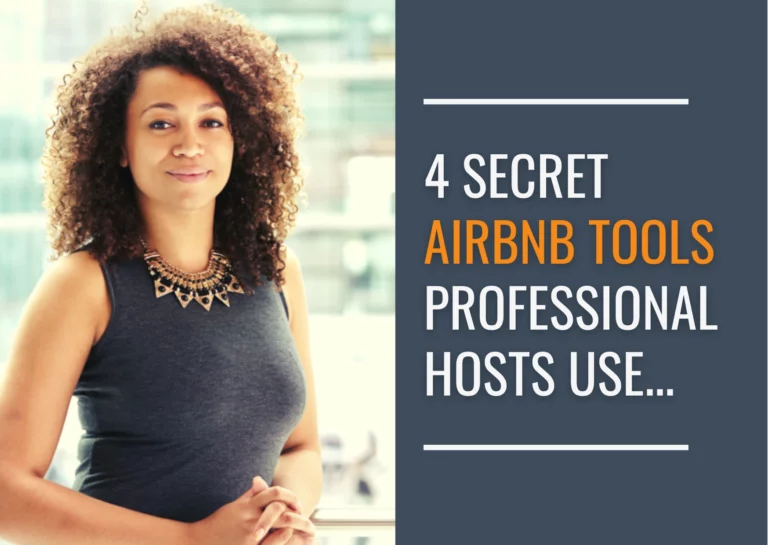Mastering Airbnb Categories: Strategies for Hosts to Maximize Search Potential
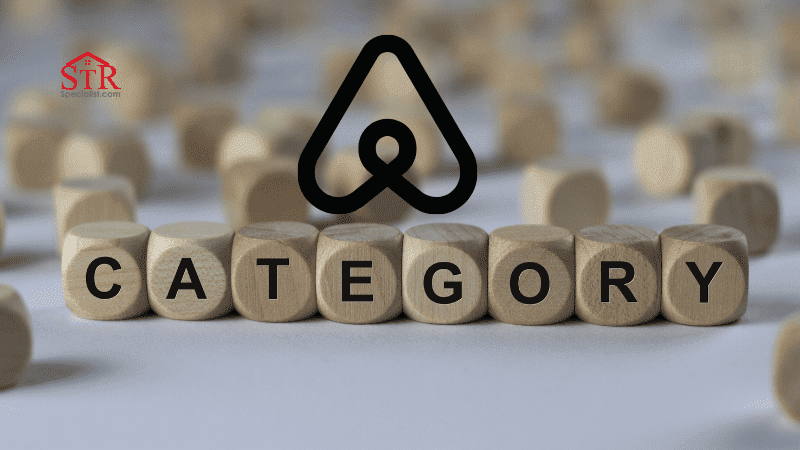
In May 2022, Airbnb unveiled a groundbreaking feature known as Airbnb Categories, marking a significant milestone for the platform. This innovative addition allows guests to explore a vast array of unique accommodations worldwide, even if they are unsure of the exact search terms. Airbnb boldly declared this enhancement as the most significant change to their platform in the past decade. While guests embrace this transformative search algorithm, it’s natural for Airbnb hosts to wonder how this evolution affects their listings. Are there specific steps hosts can take to ensure their properties are correctly categorized within Airbnb’s system? In this article, we delve into the intricacies of Airbnb Categories and unveil strategies that empower hosts to optimize their listings within this novel framework. By capitalizing on these insights, hosts can maximize their exposure, attract more guests, and fully leverage the potential of Airbnb Categories. Introducing Airbnb Categories: Expanding Search Horizons for Guests and Hosts Airbnb Categories revolutionize the way vacation rentals are organized, grouping them into curated collections across the globe. With over 60 categories available, encompassing various styles, locations, and nearby activities, hosts can showcase their rental spaces more effectively, ranging from budget-friendly rooms to luxurious mansions and even castles. By searching through categories, travelers gain access to a plethora of unique accommodations they may not have otherwise discovered, expanding their options beyond typical tourist destinations. This expanded search capability benefits hosts with listings in less prominent locations, exposing their properties to a broader audience of potential guests. What’s more, having your listing appear in multiple categories can attract the attention of diverse types of travelers, significantly boosting your booking prospects and transforming your hosting venture into a flourishing business. Leveraging tools like Hospitable.com to automate routine tasks further enhances efficiency, allowing hosts to save valuable time and focus on providing exceptional guest experiences. Airbnb employs a categorization system that clusters listings based on various themes, allowing for easier navigation and discovery. Some notable categories include: Notable Locations or Points of Interest (POI): National Parks, Islands, Desert, Tropical, Countryside, Lake, Arctic, Coastal, Beach, Top of the World, Iconic Cities. Specific Activities: Camping, Golfing, Skiing, Surfing, Play. Home-Related Categories: Barns, Trulli, Towers, Hanoks, Shepherd’s Huts, Earth Homes, Windmills, Yurts, A-Frames, Historical Homes, Caves, Treehouses, Cabins, Mansions, Castles, and more. Particular Home Amenities: Creative Spaces, Grand Pianos, Chef’s Kitchen, Amazing Pools, Bed & Breakfasts. Airbnb offers a diverse range of categories to cater to the specific preferences and needs of guests: Design Category: Ideal for guests seeking Instagram-worthy properties, this category comprises 20,000 homes renowned for their iconic architecture and stunning interiors. Adapted Category: This category showcases vacation rental homes with verified accessibility features, ensuring step-free paths into the home, bathroom, and bedroom, providing a seamless experience for guests with mobility needs. OMG! Category: Adventurous travelers can explore the OMG! category, which features the most creative and unique vacation rentals on the platform. From gothic-style hobbit holes to UFO houses and mushroom-shaped homes, these listings offer one-of-a-kind experiences. Airbnb Luxe: Handpicked for their exceptional quality, Airbnb Luxe presents high-end homes worldwide that have passed stringent evaluations based on over 300 criteria, guaranteeing superior design and functionality. Additionally, Luxe bookings come with 24/7 access to a dedicated trip designer. New Category: To assist travelers in finding recently added homes, the New category highlights listings that have recently joined the platform, allowing guests to discover fresh options. Trending Category: The Trending category showcases highly rated listings that have received positive feedback from previous guests, ensuring a reliable and satisfying stay. Airbnb Rooms: Launched in May 2023, this category offers a curated selection of over one million private rooms available for rent. Hosts in the Rooms category provide a Host Passport, which offers valuable insights about themselves, including their work, hobbies, languages, location, pet’s name, fun facts, and what makes their place unique. This enhances the personal connection between hosts and guests, fostering a more engaging and tailored stay experience. Decoding the Categorization Process: How Airbnb Classifies Listings The categorization of properties on Airbnb involves a meticulous curation process. Each listing within the Airbnb categories undergoes evaluation, drawing upon the power of machine learning to analyze a wide range of data points, including titles, property descriptions, photo captions, guest reviews, and more. It can be inferred that Airbnb has developed models that determine the optimal combination of words, photos, amenities, and other criteria needed to qualify for each category. To maintain quality and coherence, Airbnb’s dedicated platform curation team carefully reviews listings and handpicks featured photos. This crucial step ensures that each category exhibits consistency and upholds high standards of photo quality. Mastering the Art of Listing Your Property in Airbnb Categories Airbnb utilizes various factors to determine the ranking of listings, including quality of service, popularity, price, photo quality, and proximity for location-based searches. Therefore, it is crucial to ensure that your listing information is up-to-date, accurate, and comprehensive. While you may not have direct control over choosing your categories, you can influence the categorization process to a certain extent. Consider the specific categories in which you want your rental to be featured and incorporate relevant keywords associated with those categories into your Airbnb name and property description. For example, If you aspire to qualify for the Tiny Homes category, incorporating the phrase “tiny home” in both your listing title and description can greatly enhance your chances. By utilizing this specific keyword, you align your property with the desired category, increasing its visibility to potential guests seeking unique tiny home experiences. To attract more travelers, Airbnb recommends adding great photos that represent the category and inspire guests. This increases the visibility of your listing and highlights its unique features, such as interior design, amenities, or historical significance. Focus on creating a welcoming atmosphere and maintaining professional, timely communication with guests. Providing a great experience increases the likelihood of receiving excellent reviews, boosting your listing’s appeal and reputation. Unveiling Your Airbnb Category: Discovering Where Your Listing Appears Despite Airbnb’s advanced technology and human oversight in categorizing listings, occasional errors can occur. Some listings may
Airbnb and Its Background Check Procedures: What Hosts Should Know
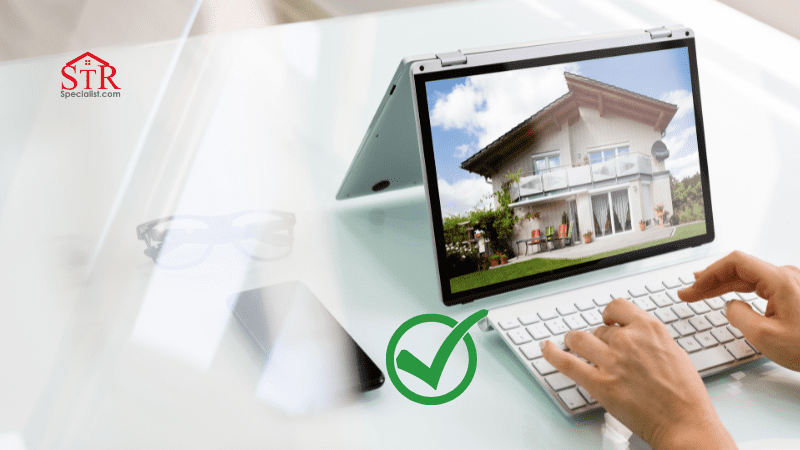
With a global network of over 5.6 million active listings, Airbnb has become a preferred choice for travelers, simultaneously providing an opportunity for individuals to generate additional income through their vacation rental properties. However, the practice of inviting unknown guests into one’s home inherently involves certain risks to both the property and business operations, making guest screening a priority for every Airbnb host. The importance of screening vacation rental guests extends beyond the prevention of severe criminal activities or fraud. It also aids in averting property damage, potential liability issues, and complaints from neighbors, and assists in spotting guests who might breach house rules. The question, however, is: Does Airbnb perform background checks on its guests? Is there a vetting process in place that hosts can depend on to mitigate potential Airbnb-related issues? Let’s delve deeper to uncover the answers. Does Airbnb Carry Out Background Checks on Its Guests? Yes, as stated in their Help Center, Airbnb conducts background checks on hosts and guests, provided they have authentic first names, last names, and dates of birth. However, this process is predominantly focused on the United States and India. Background checks on guests are initiated ten days prior to their check-in date, or later for bookings made within ten days of arrival. For hosts, background checks are performed either when they log in after setting up a listing or when someone books their property, whichever occurs first. To conduct these checks, Airbnb sends the user’s information to an approved third-party background check provider. This provider then cross-references the individual’s details against public records or accessible databases. In addition, Airbnb operates a review system that bolsters community trust. They also offer AirCover for Hosts, which includes up to $3 million in damage protection and $1 million in liability insurance. Airbnb employs specialized technology to scrutinize various aspects of each reservation and blocks bookings that exhibit a high risk of unruly gatherings or property damage. As a host on this online travel agency platform, these measures can provide some reassurance, allowing you to focus on offering an exceptional experience to your guests. While managing a vacation rental can be demanding, using vacation rental software like Hospitable.com can help streamline routine operations. What exactly does an Airbnb background check involve? According to Airbnb, they scrutinize all users engaged in transactions on their platform against the OFAC list, which encompasses terrorist designations. For users residing in the US, Airbnb cross-references specific databases containing public state and county criminal records, along with state and national sex offender registries. If a guest’s criminal record reveals an infraction that doesn’t contravene Airbnb’s policies, the booking is temporarily set to a Pending status while further information is verified. Subsequently, the guest is notified if they are permitted to book. Should an Airbnb background check uncover severe criminal convictions linked to a user, their account may be temporarily suspended for additional investigations, or entirely removed from the platform. Offenses such as murder, terrorism, rape, or child sexual abuse could potentially lead to permanent exclusion. Background Checks by Airbnb: Should You Solely Depend on Them? While Airbnb’s background checks can aid in detecting previous criminal activity or potential warning signs, provided the records are accessible, they do not ensure that a prospective guest will refrain from unlawful actions during their stay. Airbnb itself acknowledges the limitations of their checks, suggesting that hosts should not place absolute trust in these screenings when accepting guests. Let’s delve into the reasons why. Airbnb conducts background checks exclusively in the US and India, provided they have accurate first and last names along with dates of birth for the user. The platform does not perform background checks on additional individuals who may accompany the primary guest during their stay. The effectiveness of these checks relies heavily on users providing their complete and accurate legal names and dates of birth. This raises potential issues, such as the usage of stolen identification. Airbnb carries out a single background check per user, which typically occurs several months before they book a listing. Due to disparities in local US laws and reporting mechanisms, the criminal record information accessed and included in each background check can vary across states and counties. For users outside of the United States, Airbnb conducts only limited investigations. Differences in international laws and record-keeping methods may affect the scope and precision of these checks. The databases Airbnb utilizes for screening its users may not be comprehensive or current, potentially leading to gaps in the information obtained. Are There Alternatives to Airbnb’s Background Checks? Given that Airbnb’s background check system has its limitations, it’s prudent to implement additional measures to screen your guests and circumvent potential issues. This could include conducting internet and social media searches using their names, examining reviews left by other hosts, and requiring a profile picture to make a booking. Exercise your discretion when deciding who to welcome into your home. Consider disabling the “Instant Book” feature and engage in direct messaging with prospective guests to gauge their suitability before confirming their booking. Utilizing tools like Hospitable.com can make this communication process less time-consuming. Hospitable also allows you to establish your own direct booking website through the use of professional, easily customizable templates. This not only aids in saving on OTA fees, but also facilitates better guest relationships and encourages repeat direct bookings, thereby enhancing your revenue. Screening guests who make reservations through a direct booking website is a crucial step for vacation rental hosts. There’s a risk that troublesome guests could specifically target short-term rentals that facilitate direct bookings to evade the fundamental checks provided by platforms like Airbnb. The process of guest screening can be labor-intensive, but this is mitigated when you create your direct booking website using Hospitable, which offers integration with Autohost. This dependable and robust guest screening tool leverages AI to assist hosts and property managers in conducting background checks and mitigating fraud risks. All data is securely encrypted, ensuring compliance with data protection laws. When a
Deciphering Airbnb Scams: A Guide to Identification and Self-Protection
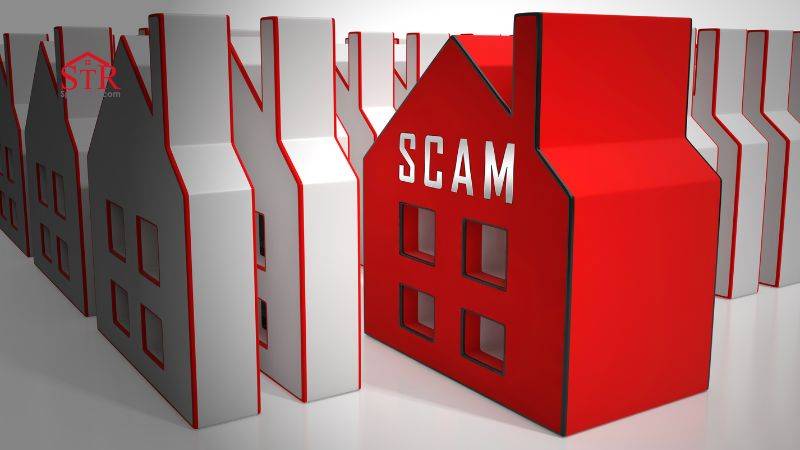
As a host on the global vacation rental platform, Airbnb, you welcome potential guests from across the world into your property. Generally, these individuals show genuine interest in the accommodations and display respect for both property and law. However, unfortunate cases of fraudulent bookings from deceitful Airbnb guests have emerged, leading to unfortunate circumstances. As a host, vigilance is crucial. In this article, we delve into common Airbnb scams and offer guidance on safeguarding against them. We also recommend perusing our other article on strategies for averting the risk of Airbnb squatters. Airbnb Scams: Recognizing the Warning Signs Airbnb property rentals can be a profitable venture, but challenging guests and deceptive activities can turn into a nightmare for hosts. Property owners have reported instances of theft and misuse of their rentals as unauthorized party venues paid for with stolen credit cards. Additionally, hosts have lamented over guests raising disputes towards the end of their stay, threatening with negative reviews in the absence of a refund. Some hosts have even reported encounters with freeloaders who introduce vermin or pests into the property as a means to claim a refund. Numerous accounts narrate the exploits of scammers using counterfeit Airbnb profiles, often deploying bots in attempts to drain the host’s bank account or steal the homeowner’s identity to deceive other guests. Awareness of fraud signs and proactive steps towards prevention are essential in protecting yourself from such duplicitous Airbnb guests. Here are some of the typical indicators of a scamming guest to watch out for: Incomplete Guest Profile A guest profile lacking in detail or bereft of appropriate photos or any photo at all can raise suspicions about the guest’s authenticity. Extra scrutiny should be applied to see if the guest has reviews from other hosts. Extreme caution is advised when your listing is their first-ever booking, as scammers are known to create multiple fake accounts to reserve properties. Contact Outside of Airbnb Scammers may reach out to you privately, using platforms like WhatsApp or text messaging, insisting on communicating outside the Airbnb ecosystem under the guise of convenience. Such scams often come with a backstory of a company covering their stay, or they’ll pay in cash. Alternatively, they might request additional information about your property or desire to inspect your listing prior to a long-term booking. These excuses can be limitless. It’s best not to entertain such requests. Reject them, report to Airbnb, and delete them promptly. Resist the lure of personal contact with unknown individuals to bypass Airbnb fees. Airbnb has inbuilt protections and can authenticate its users’ identities. Undertaking private transactions with unknown individuals online can be risky, unless facilitated through a platform that enables direct bookings. If you possess such a platform, you can incorporate your security measures into your direct booking website and utilize it as a brand building tool and to foster relationships with travelers. Overpay and Request a Refund Scam The “overpayment and refund” scheme is another deceptive practice to be wary of. Here, the so-called “guest” convinces the host to accept payment via a check. Following this, they dispatch the check via mail but intentionally overstate the amount. The guest then requests a refund for the excess. Once the host refunds the overpayment, they discover the original check fails to clear. Consequently, it’s crucial to refrain from accepting check payments and only engage with secure payment methods to avert such scenarios. Host Deception by Airbnb Guests: How Airbnb Ensures Host Security Airbnb diligently endeavors to fortify its platform’s security, employing an ID verification process to detect hosts or guests attempting to use fraudulent identification. In November 2022, Airbnb launched a policy designed to enhance the hosting experience and foster trust within its community. This policy necessitates all guests from the top 35 countries, encompassing nations such as France, Germany, Italy, Great Britain, and the US, to authenticate their identities for a reservation to be confirmed. This stipulation applies to 90% of all bookings. Furthermore, Airbnb disclosed its plans to expand mandatory guest verification worldwide by spring 2023. To validate personal details, Airbnb requests credentials such as the user’s legal name, residential address, contact number, and other relevant contact information. They may additionally request a photograph of a valid government-issued ID and/or a selfie to corroborate the user’s identity and curb fraudulent conduct on the platform. Airbnb may also conduct background checks to ascertain the safety of their community members when renting a property. How Can You Safeguard Against Deceptive Airbnb Guests? Despite Airbnb’s rigorous identity verification system, it does not conclusively confirm a person’s identity or ensure the safety of interactions. Given that trust in a stranger is not always justified, comprehensive screening of your guests before confirming a booking becomes essential. Prudent steps include examining the guest’s profile in detail, reading reviews thoroughly, and soliciting additional information such as the purpose of their trip. You could also request identity verification before confirming the booking. Importantly, heed your intuition—if a reservation doesn’t feel right, it’s preferable not to proceed with it. In scenarios where your property is listed across multiple Online Travel Agencies (OTAs) and you manage a direct booking website, it’s vital to implement your own guest screening process for vacation rentals. While this may seem like an arduous task amid various responsibilities, much of this can be automated with vacation rental software like Hospitable, freeing up time for more significant tasks such as marketing your listing and dedicated guest screening. To ensure your safety, Airbnb strongly advises maintaining all communication via the Airbnb platform until the reservation is confirmed. Engaging in external communication channels, such as Facebook Messenger or text messages, might compromise the protective measures Airbnb offers, including Host Damage Protection, Host Liability Insurance, Payments Terms of Service, and other security features. Ensure that your listing comprehensively outlines house rules and includes a detailed guest manual. This should encompass all pertinent details that potential guests should be aware of prior to booking. Airbnb also encourages hosts to utilize its messaging system
Avoiding Vrbo Frauds: Security Guidelines for Hosts

The rising prominence of Online Travel Agencies (OTAs) such as Airbnb and Vrbo has revolutionized the way travelers secure vacation rental properties. It now allows them the convenience of booking a home-like space for their stay, replete with all amenities and comforts that a house or apartment offers. Simultaneously, for property owners, platforms like Vrbo and its counterparts present an enticing avenue to lease their vacation properties, thereby providing a potential source of additional income or the foundation for a thriving Short-Term Rental (STR) business. However, this popularity does not come without its challenges. Both property owners and guests utilizing these OTAs may find themselves exposed to the risk of scams that manifest in diverse forms. So, is it possible to be scammed on Vrbo? In the following sections, we will delve into the various ways to identify Vrbo scams and provide useful advice on how to safeguard oneself from potential fraudsters. Is it Possible to Encounter Scams as a Vrbo Host? Regrettably, no online platform is entirely immune to the menace of vacation rental scams, not even the seemingly secure ones like Vrbo, despite their rigorous security procedures aimed at safeguarding users. One vital point to remember is that caution is not solely the domain of guests. Hosts too, are susceptible to becoming victims of cunning fraudsters, who exploit security loopholes in Short-Term Rental (STR) listing platforms for illicit monetary gains or to pilfer personal information. While Vrbo does perform cursory background checks by verifying guest identities, these measures are far from exhaustive. Hence, Vrbo hosts cannot rely solely on these checks for comprehensive protection. The most effective defense against falling prey to Vrbo scams is to develop an understanding of the warning signs and red flags. This way, potential threats can be recognized and averted in time. Identifying Vrbo Scams: Key Warning Signs to Be Aware Of Let’s delve into the prevalent red flags that can aid in pinpointing fraudsters before you become their next victim. Here are key pointers to keep in mind for self-protection. Substandard language proficiency When you encounter a booking inquiry riddled with numerous grammatical, punctuation and spelling errors, or peculiar spacing and line breaks, treat it as an initial red flag possibly indicative of a scammer. Fraudsters often send such messages to gauge your gullibility and patience levels. Unsolicited offsite communication requests Fraudsters may attempt to lure you into communicating outside of the Vrbo platform. Any inquiry providing their email or phone number should be treated with extreme caution. For your own safety, it’s advisable to maintain all guest communications within the Vrbo platform. Implementing automated guest messaging via vacation rental software like Hospitable.com can be a practical step towards not just saving time, but also ensuring your guests receive the relevant information promptly and at the right time. Demand for Unreliable Payment Methods If a guest suggests paying for their reservation via methods such as certified check, cashier’s check, or an unsecured wire transfer, this could be a clear attempt to defraud you. Such payment methods are highly risky due to the likelihood of fraudulent checks or the potential reversal of the transfer. Such a scam might be employed by a guest booking a short stay with little notice – perhaps 24 hours in advance. This ploy allows the scammer to occupy your property before the bank identifies the fraudulent payment method. By the time funds are reversed, the scammer has already left. Excessive Payment This is a common scheme. An overpayment scam typically involves a guest sending more funds than required through a check or money order. Before your bank identifies that the check was counterfeit or stolen, the scammer requests a refund of the excess amount, often excusing the overpayment as a mistake by their travel agent. Fraudsters may also book using a credit card, but request refunds via bank transfer. Often, they utilize stolen credit card information for such transactions. Impersonation Scammers might pose as a trusted or respectable figure, such as a sea captain, doctor, religious figure, or military personnel. This tactic is designed to lull the Vrbo host into a false sense of security and is often coupled with an overpayment scam. Orchestrating a Surprise Trip Scammers may claim they’re booking your property on behalf of someone else, possibly as a surprise for a friend. This is typically their way of explaining discrepancies in the names provided during payment. Safeguarding Against Vrbo Scams With an understanding of what to watch out for, it’s crucial to incorporate safety measures to avoid falling prey to Vrbo scams. Here’s what you can do to shield yourself. Implement thorough guest screening before accepting bookings. Carefully examine their Vrbo profiles and scrutinize all details. If a traveler’s profile appears incomplete or provides bare minimum information, consider this a potential red flag. They may be concealing something, which raises questions about their trustworthiness. Consider requesting additional information or verify their social media profiles. Though you may argue that a host’s schedule is packed with responsibilities, leaving little time for guest screening, resorting to vacation rental software like Hospitable.com can automate most of your routine tasks, affording you more time for other crucial duties. Ensure all transactions take place through the Vrbo platform. This is the most straightforward method to guarantee successful payments. Avoid agreeing to payment via third-party channels if suggested by any party. Refrain from issuing refunds for excess payment. Convey this policy to all potential guests explicitly, to deter scammers from attempting such fraudulent schemes. In the event you receive an illegitimate booking inquiry, promptly mark it as spam and notify Vrbo, especially if you suspect it to be a scammer’s booking request. Closing Remarks While the risk of scams is a reality in the landscape of rental listing sites, Vrbo scams are more of an exception than a norm. The majority of potential guests are genuinely seeking a pleasant experience at your property. By being vigilant while reviewing booking inquiries and adopting measures to deter fraud, you can ensure
Highly-Rated Hand Soaps to Stock in Your Airbnb
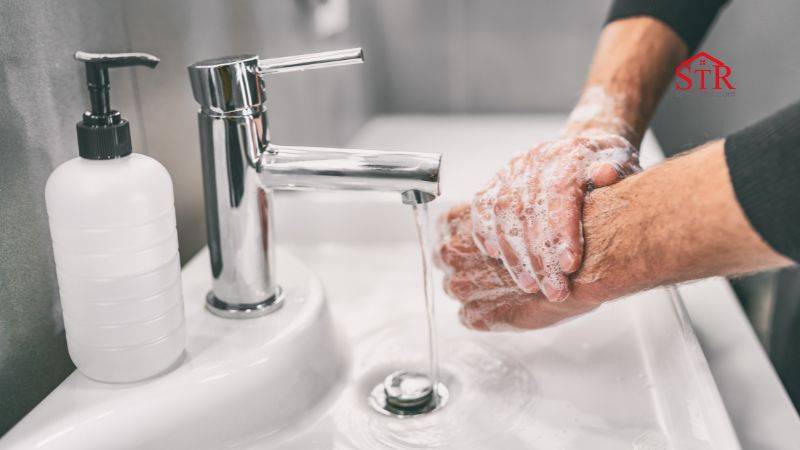
Numerous individuals have a hand soap they particularly enjoy using in their homes. Some opt for traditional bar soaps, while others are inclined towards foam or liquid variants. Then there’s the matter of fragrance – some adore scented soaps, while others prefer a scent-free option. As a host, how do you decide on the best hand soaps for your Airbnb? Let’s delve into a list of our top picks.
Airbnb Resolution Centre – How To Send Or Request Money on Airbnb

The Airbnb Resolution Centre lets you request or send money for matters related to an Airbnb trip. If it’s a general claim and not related to the Airbnb security deposit, you have to raise it within 60 days of the reservation checkout date. This is for claims under the Host Protection Scheme to compensate hosts for significant damage involved in hosting. For security deposit claims, you have 14 days from the checkout date or before the next guest checks in, whichever is earlier. This is for minor damage done up to the amount of any security deposit that the host has set. Airbnb does not keep the security deposit from the guest on booking; they place a hold on the guest’s card, which is released once a hosting has been finalised without incident. Convered in this post How to Request or Send Money Step 1: The option to ‘Send or request money’ is within the conversation screen, head over to your Airbnb inbox and click the conversation with the guest. Step 2: As you scroll down on the conversation screen, after ‘Payout’ and ‘Private Notes’ option on the left side, you will see this one. Step 3: On the next screen you can choose to send or request money: Step 4: Next, choose reason for the request. Step 5: Choose how much you would like to request on the next screen. Step 6: You can upload documentary evidence like receipts or photos to support your request on the following screen. You can skip this option if you want. Step 7: You can add a note with your claim for the other party on the next screen. Step 8: And on the last screen you can review the information before the claim is finally sent over to the guest. Involve Airbnb Raising a claim sends a notification to the other party to accept or reject the request. If you don’t conclude within 72 hours, you can involve Airbnb to make the final decision. To involve Airbnb: Go to www.airbnb.com/resolutions Select the reservation Choose ‘Involve Airbnb‘ Best practices for raising a claim as a HOST In case of a damage claim, allow the guest to explain the situation before you raise a claim. Try to negotiate with guests before you get Airbnb involved. If you are raising a damage claim, raise it as soon as you know a claim has to be raised. Step 1: Send photos or other proofs of the damage to the guest and ask them to clarify Step 2: Raise a claim in the Airbnb resolution centre Step 3: Be upfront, get in touch with Airbnb and explain the situation. As things progress, provide precise details of the damage. Include as many photos and video supported by receipts, invoices, estimates, or links to comparable items denoting actual value for the repair or replacement. Do not make up a replacement/repair amount yourself. Consider increasing the security deposit on the listing but keep in mind if you raise it too high it may put off people booking your place. Best practices for raising a claim as a GUEST Try to negotiate with the host without getting Airbnb involved. Keep a good track record on Airbnb, things go wrong all the time in homes, be kind to your hosts. Prepare a detailed explanation on why the damage was not done by you or is not your responsibility. Provide Airbnb with inconsistencies, inaccuracies, and irresponsibility on the part of the host. This article covers frequently asked questions related to Airbnb claim procedures: How do I access the Airbnb Resolution Center? How do I file an Airbnb claim? How long does it take for Airbnb to reply?
Elevating Your Airbnb’s Aesthetic with Cost-Effective, Luxury Wall Art

As you set up your Airbnb, certain expectations undoubtedly come to the fore. Your accommodation must embody comfort, cleanliness, and a sense of warmth. Yet, for numerous hosts, wall art often becomes a secondary concern, usually represented by a few arbitrary paintings placed on the wall without meticulous thought. Nevertheless, the inclusion of thoughtful, aesthetically pleasing wall art can significantly enhance the ambiance of your property, and it doesn’t have to break the bank. We will provide guidance on key factors to consider when selecting wall art and recommend a few affordable options available on Amazon. These budget-friendly choices of wall decor will infuse an element of luxury into your Airbnb. Guidelines for Selecting Your Wall Decor: The artwork you select should harmonize with your Airbnb’s aesthetic and local surroundings. The artistic elements for a rustic cabin will greatly differ from those suitable for a contemporary penthouse. Here are some key considerations for your wall decor: Harmonize with Your Space Your chosen art pieces should blend seamlessly with your living space rather than overpower it. Bear in mind the size of your wall space and whether a grand or modest piece would better suit the ambience you aim to cultivate. Position your art at a height that isn’t too high or low, typically just slightly above eye level. If you’re arranging a collection of prints, varying the height can add dynamism and create a stylish gallery wall. Consider utilizing small spaces in your Airbnb, such as bathrooms or laundry rooms, for additional artwork. Stay Away from Controversial Themes While everyone’s taste varies, it’s important not to confuse personal taste with potential offense. It’s advised to steer clear of nude art, political caricatures, and religious imagery to accommodate a diverse range of guests. Embody Local Flavor Consider integrating art that symbolizes your local area. A depiction of the Manhattan skyline may be fitting in New York, but it might seem out of place in a Nebraska dwelling. Local artists may offer unique and fitting pieces, and even give guests the opportunity to purchase a piece as a keepsake. Consistency in Color and Theme Maintain a consistent color scheme or theme throughout your Airbnb to ensure a harmonious journey for your guests. Loud prints or alternating colors can be jarring and unsettling. Solicit Opinions If you’re uncertain about your art selection, don’t hesitate to ask friends or family for their insights. Explore other Airbnb listings online to gather inspiration and learn what other hosts are incorporating. Prudent Spending Avoid overpopulating your walls; a few impactful pieces can be more effective than an overcrowded array. Creating a luxurious feel doesn’t require excessive spending. Suggestions for Wall Art In today’s world, there’s no need for exhaustive searches at garage sales or galleries to find suitable wall art. Amazon offers an abundant selection. Here are a few of our top picks: 1. Lake Landscape with Birds in Flight This canvas piece, measuring 24×24 inches, captures the picturesque beauty of a lake under a sunset with a bird flying over a tropical island pier. It is a compelling sight that can make guests feel instantly at ease and welcome. 2. Sunlit Forest Scene The foggy forest scene can create a soothing and tranquil ambiance, which can make your guests feel relaxed and comfortable during their stay. 3. Vibrant Abstract Art This piece features an abstract silver metal figure on a black and white canvas, bringing an element of stylish elegance and sophistication to your space. This can create a visually appealing environment for your guests. 4. Landscape Oil Painting River In Autumn Forest This artwork, a reproduction of an oil painting, depicts a river flowing through an autumn forest. Its rich colors and detailed portrayal can make your space more visually engaging and welcoming for guests. 5. Floral Watercolor Paintings This watercolor botanical artwork, with its floral design and gold leaf branches, adds a touch of sophistication and elegance to your space. Its subtle charm can significantly enhance your Airbnb’s aesthetic appeal. 6. Mountain Abstract Decor This three-piece geometric mountain print offers a striking yet sophisticated visual display. The combination of mountainous scenery and geometric patterns creates a unique and appealing look that can add interest to your space. 7. Impressionist Mountains and Valleys This abstract nature-themed print, with its depiction of a mountain sunset and forest wilderness, adds a stylish and contemporary touch to your Airbnb. The vibrant colors and imaginative representation can captivate your guests and enhance the visual appeal of your space. You may also like: Crucial Bathroom Supplies for Your Airbnb: The Ultimate Shopping List Airbnb Shopping List – Kitchen Essentials
Crucial Bathroom Supplies for Your Airbnb: The Ultimate Shopping List
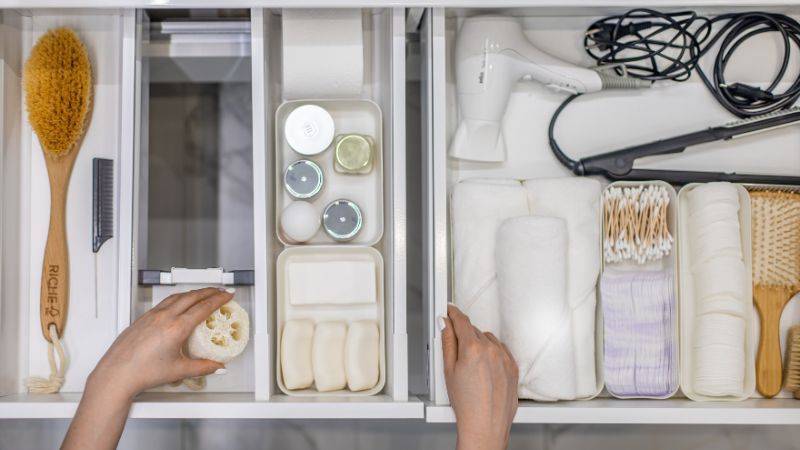
Neglecting to equip your rental with necessary bathroom amenities can lead to significant issues with your guests. Utilize this checklist to guarantee you’ve covered all bases, ensuring your guests enjoy a relaxing and hassle-free stay. 1. Soap Dispenser A soap dispenser is essential for maintaining hygiene. Providing one gives guests a clear signal that you prioritize cleanliness, and it also eliminates the wastage that often comes with single-use soap bars. 2. High-quality Towels Comfort is key for an enjoyable stay. High-quality towels provide a touch of luxury that guests appreciate and remember. They contribute to the overall impression of your Airbnb, impacting guest satisfaction and reviews. 3. Shower Head A high-quality shower head can make a big difference to the guest’s experience. It not only ensures an enjoyable shower but can also be a reflection of your attention to detail and commitment to providing the best for your guests. 4. Hair Dryer Many guests expect amenities similar to what they’d find in a hotel. A hairdryer is one of these expected conveniences. It’s especially crucial for guests who may be traveling for business or special events where they need to look their best. 5. Plunger A plunger may not be the most glamorous amenity, but it’s a practical item that can prevent minor inconveniences from becoming major problems. Having one readily available shows you’re prepared for any eventuality, putting guests at ease. 6. Toilet Brush A clean and sanitary bathroom is a top priority for most guests. By providing a toilet brush, you’re giving guests the tools to maintain cleanliness during their stay, and it also reflects your own standards of hygiene. You may also like Top 25 List of Must-Have Airbnb Products Under $25 Airbnb Receipt Template – Host Essentials Airbnb Check Out Instructions Template – Host Essential
Top 25 List of Must-Have Airbnb Products Under $25

Interested in ensuring your Airbnb is fully equipped with necessary items? We’ve gathered an extensive list of suggestions directly from seasoned Airbnb hosts to guide you. What’s more, every single item on this list comes with a price tag of $25 or less! So, let’s jump into shopping – presenting the top 100 indispensable Airbnb products for under $25. 1. Keurig Coffee Pod Holder The Everie Coffee Pod Carousel holder provides an organized storage solution for up to 40 K-cups, optimizing your counter space and offering your guests a convenient way to locate their preferred coffee. 2. Glass and Diamond Cut Candy Jar Enhance the charm of your place with the Danmu Colorful Glass and Diamond-Cut Candy Jar. This delightfully whimsical jar can accommodate up to 26 oz. of candy. 3. Matching Silverware The stylish, black stainless steel cutlery set from WVT, designed for four people, includes dinner knives, dinner forks, dinner spoons, teaspoons, and salad forks. Each piece is designed for comfort, built with rust resistance, and crafted for durability. 4. Can Opener A firm-grip, slip-resistant can opener equipped with a magnetic lid lift? Sounds ideal! The PrinChef can opener, with its ergonomic design, serves as a perfect solution for guests who might require additional help when using a can opener. 5. Electric Tea Kettle The Elite Gourmet electric tea kettle can bring a liter of water to a boil in just 6 minutes. Its 360-degree swivel base offers the convenience of gripping the handle from any direction, ensuring safe water pouring. 6. Iron Getting rid of wrinkles doesn’t require an upscale iron. The Utopia Home steam iron presents excellent value with features like a customizable thermostat, protection against overheating, and a 200-milliliter water tank. 7. Flashlight LUMINOUS – The S1000 effortlessly lights up an entire space, rendering it an excellent universal flashlight for daily use, outdoor pursuits, and an ideal Father’s Day present. 8. Extension Cords Offering ample and accessible power outlets for guests’ numerous devices is essential, and extension cords can provide that flexibility and convenience. 9. Travel First Aid Kit Safety first. A travel first aid kit is a crucial provision for guests, ensuring they have immediate access to medical essentials in case of minor injuries or emergencies. 10. Outdoor Ashtray For guests who smoke, providing an outdoor ashtray helps maintain cleanliness, respect for non-smoking guests, and overall aesthetic appeal of your Airbnb. 11. Chess A classic chess set not only adds a touch of sophistication to your space, but also provides an engaging activity for guests during their downtime. 12. String Lights They add warmth and ambiance to any space, making your Airbnb feel more cozy and welcoming. 13. Multi Head Phone Charger As guests come with different devices, a multi-head phone charger caters to all needs, offering a handy, one-stop charging solution. 14. Toothbrush & Toothpaste Kit Providing these basic toiletries helps guests feel cared for, especially if they’ve forgotten their own or arrived late. 15. Antibacterial Hand Soap Promoting hygiene should be a top priority, and providing antibacterial hand soap is a simple way to ensure your guests’ health and safety. 16. Tissue Boxes Essential for daily use, easily accessible tissue boxes add to your guests’ comfort and convenience. 17. Razor Providing a new, clean razor can be a thoughtful touch, especially for guests who are on a short trip or have forgotten their own. 18. Hair Dryer An expected amenity in most lodgings, a hair dryer is essential for guests who need to prep for a day out or a special event. 19. Bath Mats They provide safety and comfort, preventing slipping on wet floors and giving guests a plush spot to step post-shower. 20. Toilet Paper It’s a basic necessity, and ensuring an ample supply demonstrates thoughtfulness and attention to detail. 21. Moist Makeup Cleansing Wipes An extra touch of hospitality, these can help guests maintain their skincare routines while away from home. 22. Fleece Blanket Offering additional warmth and comfort, a fleece blanket can make guests feel more at home, particularly during colder months. 23. Mattress Protector Protects your investment and provides an extra layer of hygiene, ensuring guests can sleep with peace of mind. 24. Mixing Bowls Necessary for guests who choose to cook during their stay, mixing bowls are a staple in any well-equipped kitchen. 25. Kitchen Utensils From cooking to serving, quality kitchen utensils are key for self-catering guests to feel at home and comfortably prepare meals. You may also like Essential Items For Your Airbnb Bedroom Shopping List Airbnb Superhost Checklist The Best Smart Home Devices for Your Airbnb Property: Enhance Your Guests’ Experience and Streamline Your Operations
Essential Items For Your Airbnb Bedroom Shopping List
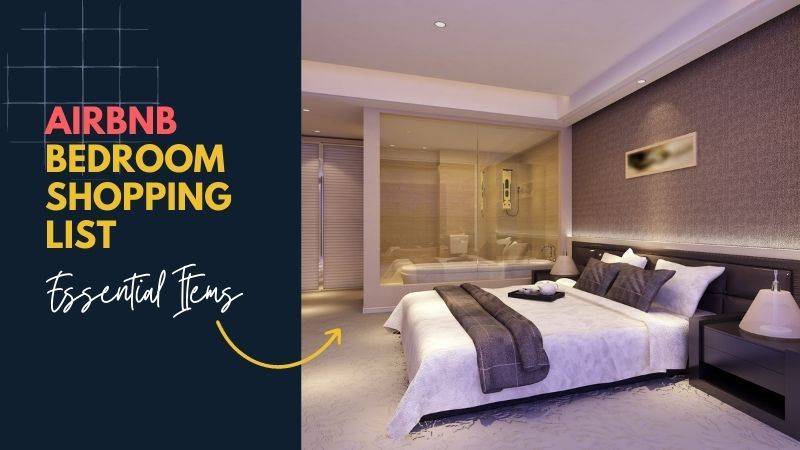
As an Airbnb superhost, you want to make sure each bedroom in your short-term rental is fully equipped for your guests’ comfort. To ensure a great experience, keep in mind these essential items when preparing your bedrooms. Our checklist of bedroom essentials will help make your shopping quick and easy. Must-Have Items for Your Airbnb Bedroom: A Checklist of Essentials Premium Bedding for a Luxurious Airbnb Bedroom Experience As an experienced Airbnb superhost, I know that providing high-quality bedding is crucial for a comfortable stay in your short-term rental. Even the best mattress can feel uncomfortable if the sheets aren’t up to par. That’s why I highly recommend investing in these affordable, durable, and comfortable sheet sets. They are a true bedroom essential that will ensure your guests get a good night’s sleep and leave rave reviews about their stay. Mattress Protector As an Airbnb host, investing in a quality mattress protector can bring multiple benefits. In addition to protecting your mattress from stains and damage caused by guests, it can also safeguard against bed bugs. This mattress protector is not only waterproof, but also dust-mite-proof and bed-bug-proof, ensuring a hygienic and comfortable sleeping environment for your guests. Remember to also use protectors for the box spring, as these can easily become infested with bed bugs. Extra Pillows You’re likely aware of how essential quality pillows are for a good night’s sleep. To accommodate your guests’ preferences, it’s a good idea to keep 2-3 extra pillows in the closet of each bedroom. While some guests may be comfortable with 1 or 2 pillows, many others prefer to sleep with more. By providing extra pillows, you can ensure your guests have a comfortable and personalized sleep experience during their stay. Extra Blankets Additional blankets are essential. Based on your region’s weather, you might prefer a lighter alternative or a more practical, robust choice. Regardless, guests have consistently appreciated the availability of cozy blankets for added nighttime warmth or cozying up on the sofa. These blankets are not only lightweight but also come in a variety of hues to suit any color palette. Luggage Racks While a luggage rack might appear to be a discretionary item, it is indeed a crucial element for a bedroom. It not only offers guests a designated area for their bags but also aids in preventing bed bug infestations by keeping suitcases separate from bedding. Hangers Hangers are valued by guests, particularly for longer stays. Opting for wooden hangers over plastic ones may be more appealing to some visitors. Providing around twenty hangers per room is sufficient. Moreover, hangers are a prerequisite for a Work Collection-eligible listing, which could potentially boost your search rankings. Ironing Board An ironing board is a fundamental item for bedrooms; however, a compact version will suffice. This portable, tabletop ironing board is convenient and simple to store, making it an ideal choice for holiday accommodations. Iron In vacation rentals, having an easy-to-use iron is essential. We recommend this particular model, which includes an automatic shut-off function. Don’t overlook this item, as an iron is a necessary component for a Work Collection listing. Pillow Protectors Elevate your Airbnb bedroom experience with our essential Pillow Protectors. Ensure your guests enjoy a comfortable, clean, and healthy sleep environment with this must-have addition to your Airbnb bedroom. Duvet Upgrade your Airbnb bedroom with our sumptuous Duvet, a key essential for providing guests with ultimate comfort and warmth. Create a welcoming atmosphere and leave a lasting impression on your guests with this elegant bedroom addition. Bed side lamps Enhance your Airbnb bedroom with our stylish Bedside Lamps, perfect for creating a warm and inviting ambiance. Set the stage for a memorable stay by adding these elegant and functional accents to your space. Bed side Alarm clock Discover the convenience and style of Bedside Alarm Clock, designed to complement any bedroom décor. Bedside Rug Elevate your Airbnb with our cozy Bedside Rug, providing guests with a warm, plush surface for added comfort. Available in diverse colors and patterns, rug complements any bedroom decor, making their stay even more memorable. Dresser Enhance your Airbnb with a spacious Dresser, offering guests ample storage for their belongings. With a stylish design and functional layout, this essential piece ensures a convenient, clutter-free stay for a more enjoyable experience. Full-length mirror Add a touch of elegance to your Airbnb with a Full-Length Mirror, allowing guests to effortlessly prepare for the day ahead. This practical essential enhances the room’s aesthetics while providing convenience and a sense of spaciousness. Duvet Cover Boost your Airbnb’s appeal with a high-quality Duvet Cover, ensuring guests enjoy a warm, cozy, and restful sleep. Available in various designs, this bedroom essential adds a touch of sophistication while providing optimal comfort. Conclusion: By including essential items such as a comfortable mattress, high-quality bedding, ample storage, functional lighting, and thoughtful amenities, you will create a space that caters to the needs and preferences of a diverse range of travelers. A well-equipped and welcoming bedroom not only contributes to positive reviews and repeat bookings but also helps you stand out in the competitive world of short-term rentals. By investing time and resources into crafting the perfect Airbnb bedroom, you are setting yourself up for long-term success and guest satisfaction. You may also like, Airbnb Superhost Checklist Airbnb Shopping List – Kitchen Essentials
Airbnb Superhost Checklist
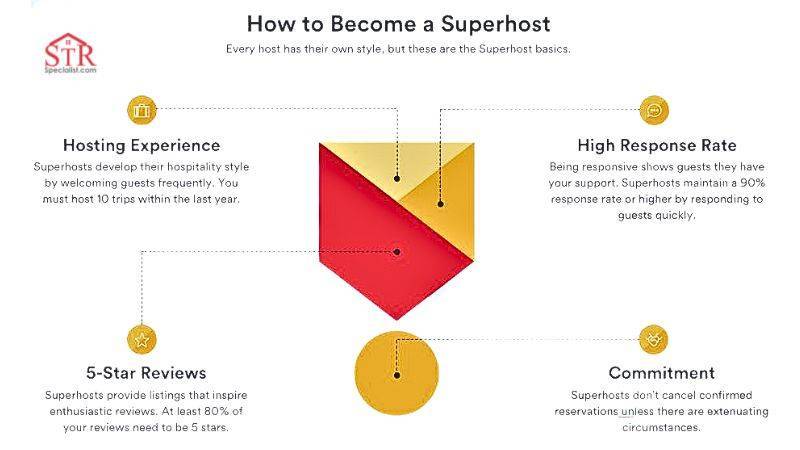
If you’re an Airbnb host looking to achieve Superhost status, there are several requirements you need to meet. Superhost status is a recognition program that Airbnb offers to hosts who go above and beyond in providing exceptional hospitality to their guests. In this article, we’ll provide you with an Airbnb Superhost checklist to help you achieve this coveted status. Host Status 1. To be eligible for Superhost status, you need to meet the following host status requirements: Item Description Host rating Response rate A response rate of at least 90% Cancellation rate A cancellation rate of less than 1% Completed Trips 2. To qualify for Superhost status, you need to have completed at least 10 trips in the last year. Hosting Standards 3. To be eligible for Superhost status, you need to meet the following hosting standards: Item Description Acceptance rate An acceptance rate of at least 88% Commitment to Airbnb’s policies Compliance with Airbnb’s policies, including the no-party policy Communication Responding to guest inquiries and issues promptly and professionally Listing accuracy Ensuring that your listing accurately reflects the property and amenities Cleanliness Maintaining a high level of cleanliness and tidiness in your rental property Check-in experience Providing a smooth and hassle-free check-in experience for your guests Value Offering competitive pricing and exceptional value for your guests Experience Standards 4. To qualify for Superhost status, you need to meet the following experience standards: Item Description Guest ratings A minimum of 4.8 overall guest rating Accuracy Ensuring that your experience accurately reflects the description and expectations set for guests Communication Communicating effectively with guests before, during, and after the experience Professionalism Maintaining a high level of professionalism and adhering to Airbnb’s guidelines By using this Airbnb Superhost checklist, you can ensure that you’re meeting all of the requirements necessary to achieve Superhost status. Remember to maintain a high level of hospitality and professionalism, respond to guest inquiries and issues promptly, and provide a smooth and hassle-free rental experience for your guests. By doing so, you’ll be well on your way to achieving Superhost status and reaping the many benefits that come with it. You may also like, The Best Smart Home Devices for Your Airbnb Property Airbnb Check Out Instructions Template – Host Essential
The Best Smart Home Devices for Your Airbnb Property: Enhance Your Guests’ Experience and Streamline Your Operations
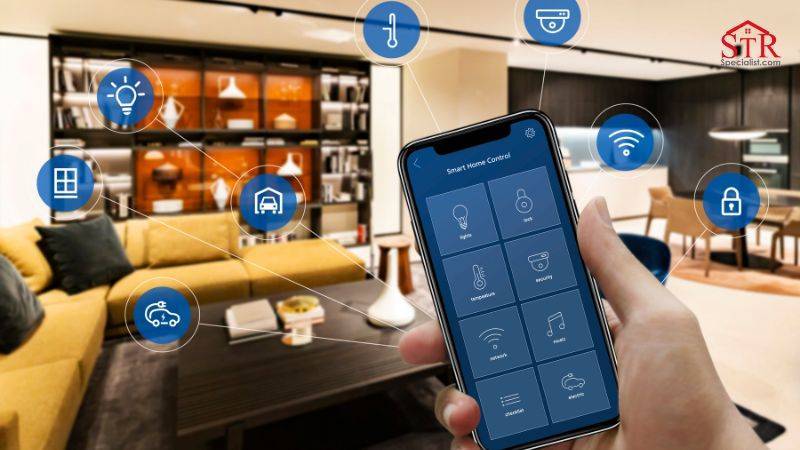
As an expert in managing Airbnb properties, I understand that providing a seamless experience for guests is crucial to running a successful Airbnb business. Today’s travelers are tech-savvy, and incorporating smart home devices into your property can impress guests, increase efficiency, and boost your bottom line. In this article, I will discuss the best smart home devices to enhance your Airbnb property and make hosting a breeze. 1. Smart Locks One of the most significant investments you can make for your Airbnb property is a smart lock. These devices provide keyless entry, allowing guests to access the property with a unique code or their smartphone. This eliminates the need for physical keys, reducing the risk of lost keys or unauthorised access. Top Picks: 1. August Wi-Fi Smart Lock 2. Schlage Encode Smart Wi-Fi Deadbolt 3. Yale Assure Lock SL with Z-Wave 2. Smart Thermostats Smart thermostats offer energy-efficient temperature control and can help you save on utility bills. These devices learn guests’ preferences and adjust the temperature accordingly, ensuring a comfortable stay. You can also monitor and control the thermostat remotely, which is useful for managing multiple properties. Top Picks: 1. Nest Learning Thermostat 2. ecobee SmartThermostat 3. Honeywell Home T9 Wi-Fi Smart Thermostat 3. Smart Security Cameras Investing in smart security cameras can enhance the safety and security of your Airbnb property. These cameras can monitor the exterior of your property and notify you of any suspicious activity. Guests will appreciate the added layer of security, and you’ll have peace of mind knowing your property is protected. Top Picks: 1. Nest Cam Outdoor 2. Arlo Pro 4 Spotlight Camera 3. Ring Floodlight Cam 4. Smart Lighting Smart lighting can create a welcoming ambiance for your guests while providing energy-saving benefits. By allowing guests to control the lights through their smartphones or voice commands, you can offer a customized experience that sets your property apart. Top Picks: 1. Philips Hue White and Color Ambiance Starter Kit 2. LIFX A19 Wi-Fi Smart LED Light Bulb 3. TP-Link Kasa Smart Light Bulbs 5. Voice Assistants Voice assistants like Amazon Echo or Google Home can make your guests’ stay more convenient by providing hands-free control over various smart devices. Guests can ask for local recommendations, check the weather, or control the property’s smart devices with simple voice commands. Top Picks: 1. Amazon Echo Dot (4th Gen) 2. Google Nest Mini 3. Apple HomePod Mini 6. Smart Plugs Smart plugs can turn any ordinary appliance into a smart device, allowing guests to control them remotely or set schedules. This is especially useful for items like coffee makers, fans, and lamps, offering your guests a touch of luxury and convenience 7. Smart Smoke and Carbon Monoxide Detectors Safety is paramount for any Airbnb property, and smart smoke and carbon monoxide detectors provide an extra layer of protection for your guests. These devices can send alerts to your smartphone if they detect smoke or dangerous gas levels, allowing you to respond quickly and keep your guests safe. Top Picks: 1. Nest Protect Smoke and Carbon Monoxide Alarm 2. First Alert Onelink Safe & Sound 3. Kidde RemoteLync Monitor 8. Smart Water Leak Detectors A water leak can cause significant damage to your property, resulting in expensive repairs and potential downtime. Smart water leak detectors can help prevent such incidents by alerting you to any leaks or unusual water usage in real-time. Top Picks: 1. Flo by Moen Smart Water Leak Detector 2. Honeywell Home Water Leak Detector 3. D-Link Wi-Fi Water Leak Sensor 9. Smart Home Hubs A smart home hub can help you manage and integrate various smart devices in your Airbnb property. This central control system allows for seamless communication between devices, making it easier for you and your guests to control and customize the smart home experience. Top Picks: 1. Samsung SmartThings Hub 2. Amazon Echo Show 3. Google Nest Hub 10. Smart Window Blinds Smart window blinds can offer your guests privacy and convenience by allowing them to control the blinds with their smartphone or voice commands. They can also be programmed to open and close at specific times, enhancing energy efficiency and providing a comfortable environment for your guests. Top Picks: 1. Lutron Serena Smart Shades 2. IKEA FYRTUR Smart Window Blinds 3. AXIS Gear Smart Blinds Controller 11. Smart Doorbells A smart doorbell is another excellent addition to your Airbnb property. These devices can notify you when someone is at the door, and many models include a built-in camera and two-way communication, allowing you to speak with guests or delivery personnel remotely. Top Picks: 1. Ring Video Doorbell Pro 2. Nest Hello Video Doorbell 3. Eufy Security Video Doorbell 12. Smart Air Quality Monitors Air quality is essential for your guests’ comfort and well-being. Smart air quality monitors can track indoor air pollution levels and provide recommendations for improving air quality. These devices can help you maintain a healthy environment for your guests, especially those with allergies or respiratory issues. Top Picks: 1. Airthings Wave Plus 2. Awair Element Indoor Air Quality Monitor 3. Kaiterra Laser Egg+ CO2 13. Smart Irrigation Controllers If your Airbnb property has a garden or lawn, a smart irrigation controller can help you maintain a lush, green landscape while conserving water. These devices can optimize watering schedules based on local weather data and soil conditions, ensuring your outdoor spaces look their best. Top Picks: 1. Rachio 3 Smart Sprinkler Controller 2. Orbit B-hyve Smart Wi-Fi Sprinkler Timer 3. RainMachine Touch HD-16 Conclusion Investing in smart home devices for your Airbnb property can significantly enhance your guests’ experience and streamline your operations. From security and safety to convenience and energy efficiency, these devices can set your property apart from the competition and lead to higher guest satisfaction and positive reviews. As a host, it’s essential to carefully consider which smart home devices will have the most significant impact on your property and your guests’ experience. Keep in mind that the right combination of smart devices
Airbnb Check Out Instructions Template – Host Essential
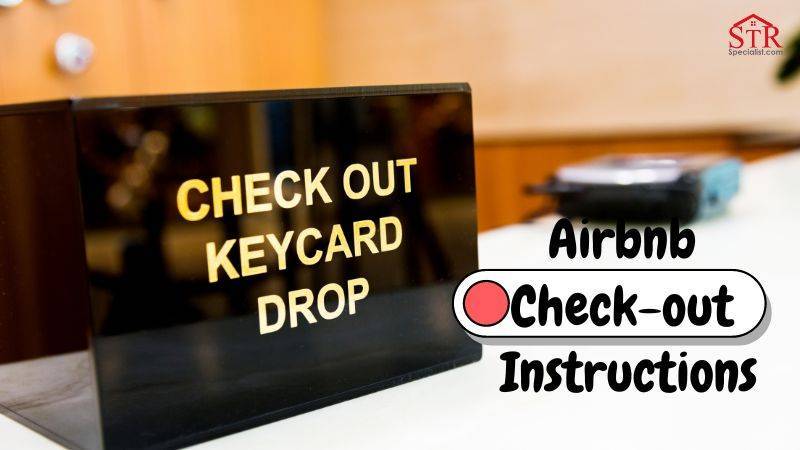
As an Airbnb host, it’s important to provide your guests with clear and concise check-out instructions. This can help ensure a smooth and hassle-free departure process for both you and your guests. To help you with this, we’ve put together an Airbnb check-out instructions template that you can use as a guide. Check-Out Time 1. The first section of the check-out instructions should clearly state the check-out time for your rental property. This helps ensure that guests know when they need to vacate the property and allows you time to prepare for the next guests. Make sure to also include any penalties or fees for late check-out: Item Description Check-out time The time by which guests need to vacate the property Late check-out fee Any penalties or fees for guests who check-out after the designated time Property Condition 2. The next section of the check-out instructions should outline the expected condition of the rental property upon check-out. This includes cleaning requirements and any damages that should be reported: Item Description Cleaning requirements Any cleaning tasks that guests need to complete before check-out Damage reporting Instructions on how to report any damages or issues with the property Key Return 3. The third section of the check-out instructions should detail how guests should return the keys to the rental property. This includes any designated key drop-off locations or instructions on how to return the keys directly to you: Item Description Key return instructions Instructions on how and where to return the keys to the rental property Key return deadline Instructions on how to report any damages or issues with the property Miscellaneous Instructions 4. The final section of the check-out instructions should include any miscellaneous instructions that guests need to know before leaving the rental property. This includes instructions on how to dispose of trash, where to leave any leftover food or supplies, and how to lock up the property: Item Description Trash disposal Instructions on how to dispose of any trash or recyclables Leftover food/supplies Instructions on where to leave any leftover food or supplies Locking up Instructions on how to properly lock up the rental property By using this Airbnb check-out instructions template, you can ensure that your guests have a clear understanding of what is expected of them upon departure from your rental property. This can help prevent any misunderstandings or confusion and ensure a smooth and successful rental experience for both you and your guests. Remember to tailor these instructions to your specific rental property and guest needs, and provide them in a timely and clear manner to ensure the best possible experience for everyone involved. You may also like, Airbnb Receipt Template – Host Essentials Airbnb Shopping List – Kitchen Essentials
Airbnb Receipt Template – Host Essentials
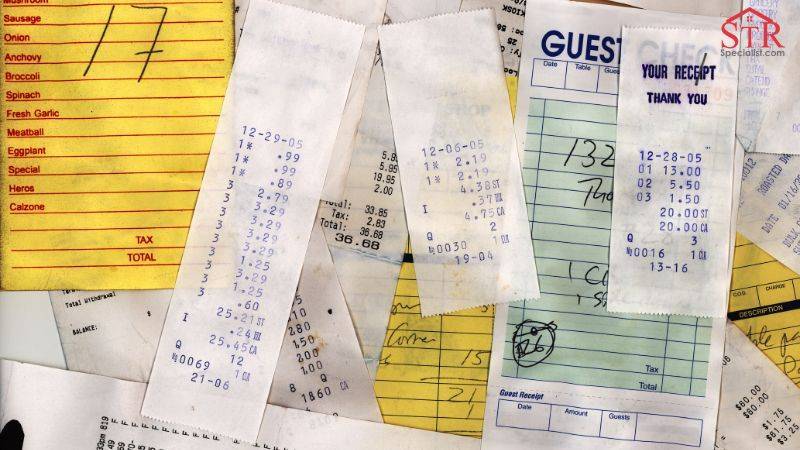
As an Airbnb host, it’s important to keep track of all financial transactions related to your rental property. This includes keeping a record of payments made by guests and providing them with a receipt for their stay. A receipt can help guests track their expenses, and it also provides proof of payment in case of any disputes. To help you with this, we’ve put together an Airbnb receipt template that you can use as a guide. Basic Information: 1. The first section of the receipt should include basic information about the rental property and the guest. This includes: Item Description Host name Your full name Property address The full address of your rental property Guest name The name of the guest who stayed at your property Date The dates of the guest’s stay Payment method The payment method used by the guest Room Charges 2. The next section of the receipt should detail the room charges for the guest’s stay. This includes the nightly rate, any additional fees, and any discounts: Item Description Amount Nightly rate The rate per night for the rental property Additional fees Any additional fees charged to the guest, such as cleaning fees or taxes Discount Any discounts applied to the guest’s stay Subtotal The total cost of the room charges before taxes and fees Taxes and Fees 3. The third section of the receipt should detail any taxes and fees associated with the guest’s stay. This includes: Item Description Amount Occupancy tax Any local or state occupancy taxes charged to the guest Sales tax Any sales taxes charged to the guest Service fee Any service fees charged by Airbnb for the booking Total The total cost of the taxes and fees Total Charges 4. The final section of the receipt should summarise all charges associated with the guest’s stay. This includes: Item Description Amount Room charges The subtotal of the room charges Taxes and fees The total cost of the taxes and fees Total The total cost of the guest’s stay By using this Airbnb receipt template, you can ensure that your guests have a clear record of their financial transactions related to their stay at your property. This can help build trust with your guests and provide them with a positive experience during their stay. Remember to keep accurate records and provide receipts in a timely manner to ensure a smooth and successful rental experience for both you and your guests. You may also like to read: Airbnb Shopping List – Kitchen Essentials The Essential Airbnb Inventory Checklist for a Well-Stocked and Organized Rental Experience
Airbnb Shopping List – Kitchen Essentials

As an Airbnb Superhost, we understand that preparing your new short-term rental may seem overwhelming. Figuring out what to provide and determining your budget can be challenging. However, with our experience, we’ve discovered the most effective items to satisfy both our needs and those of our guests. Offering a memorable experience doesn’t require purchasing the priciest products. Since it’s unclear whether guests prefer dining out or cooking in, it’s vital to equip your Airbnb with essential kitchen items. Here’s a fail-safe checklist to outfit your short-term rental perfectly! Kitchen Fundamentals: Focus on sturdy, timeless kitchen necessities. We’ve experienced remarkable success with the following items: 8-Piece Glassware Set These versatile glasses cater to your guests’ diverse beverage preferences while offering exceptional durability, sparing you the concern of frequent replacements due to breakage. 100% Cotton Towels It’s advisable to provide a minimum of four kitchen towels for your guests’ convenience, while maintaining a straightforward color scheme. 20 Piece Stainless Steel Flatware Set Opt for a reasonably priced and classic flatware set, ensuring you have a spare set in your storage closet. As forks and spoons may occasionally disappear, having a backup set enables you to maintain a well-equipped kitchen for your guests. Flatware Organizer Make sure to purchase an organizer for your flatware! Silicone Pot Holders Potholders can be easily overlooked, but they’re a must-have if your guests plan on cooking. We suggest opting for silicone potholders as they offer superior heat protection compared to the conventional cotton ones. Pots and Pans Obtain a set of pots, pans, and cooking utensils at a reasonable cost. Your guests will appreciate having the opportunity to prepare their meals! Knife Set Investing in a mid-range knife set is a wise choice. While you wouldn’t want to overspend, it’s important to avoid low-quality options as your guests may take notice. Dinnerware For your dinnerware, it is advisable to opt for a simple style and color scheme. Avoid using fragile or bulky plates and bowls. We have been using this set, which is both economical and functional, and it has served us well as an essential part of our kitchen. Wine Glasses After renting out our initial property, we discovered that numerous guests were inquiring about wine glasses. Consequently, we made it a standard provision in all our properties. We recommend the use of stemless, shatter-resistant glasses. Wine Bottle Opener Kindly share your thoughts in the comments section on the items that you believe are necessary for an Airbnb kitchen. You may also like to read, Safeguarding Your Airbnb Against Smoking and Noise Concerns
The Essential Airbnb Inventory Checklist for a Well-Stocked and Organized Rental Experience
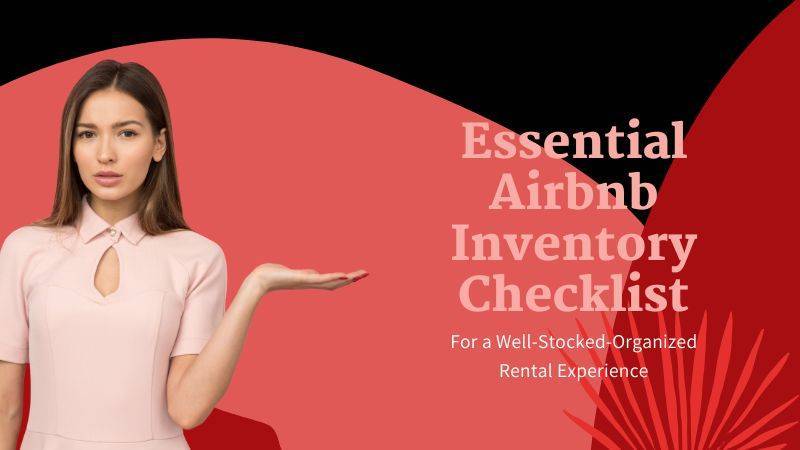
As an Airbnb host, one of the most important things you can do to ensure a successful stay for your guests is to maintain an accurate and organised inventory of your listing. An inventory checklist can help you keep track of all the essential items in your space and ensure that everything is in working order. To help you with this, we’ve put together an Airbnb inventory checklist template that you can use as a guide. Furniture The first thing to check off on your Airbnb inventory checklist is furniture. Make sure you have all the essential pieces for your guests, including: Item Quantity Condition Bed(s) Mattress(es) Dresser(s) Closet(s) Sofa(s) Chair(s) Table(s) Lamp(s) Bedding Next up on your Airbnb inventory checklist is bedding. Ensure that you have enough clean and comfortable bedding for your guests: Item Quantity Condition Sheets Pillowcases Pillows Duvet/Comforter Blankets Bathroom Supplies Your guests will also need basic bathroom supplies during their stay. Make sure you have these items available and stocked: Item Quantity Condition Towels Hand towels Washcloths Toilet paper Shampoo/Conditioner Body wash/Soap Toothpaste Toothbrushes Kitchen Supplies If your listing includes a kitchen, make sure it’s fully stocked with all the necessary supplies: Item Quantity Condition Plates Bowls Cups/Glasses Silverware Cookware (pots/pans) Cooking utensils (spatula, whisk, etc.) Cutting board Knives Dish soap Sponge Electronics and Appliances Your guests will also need access to various electronics and appliances during their stay. Make sure everything is in working order and easy to use: Item Quantity Condition TV Cable/satellite box Wi-Fi router Coffee maker Microwave Toaster Iron Hair dryer Vacuum cleaner Miscellaneous Items Finally, don’t forget about the miscellaneous items that your guests may need during their stay: Item Quantity Condition Umbrella Extra blankets/pillows Hangers Laundry detergent First aid kit Fire extinguisher Table(s) Lamp(s) Using this Airbnb inventory checklist template, you can ensure that your listing is fully stocked and ready to welcome guests. Remember to keep it updated and check items regularly to ensure everything is in good condition. With a well-stocked and organised inventory, you can provide a comfortable and enjoyable stay for your guests. You may also like to read, Mastering Airbnb Check-In Time: A Comprehensive Guide for Hosts and Guests Unlock Your Airbnb’s Potential: 40 Creative Ways to Boost Your Income and Delight Your Guests No-Nonsense Airbnb Masterclass
The Ultimate Airbnb Host Checklist for a Seamless Guest Experience
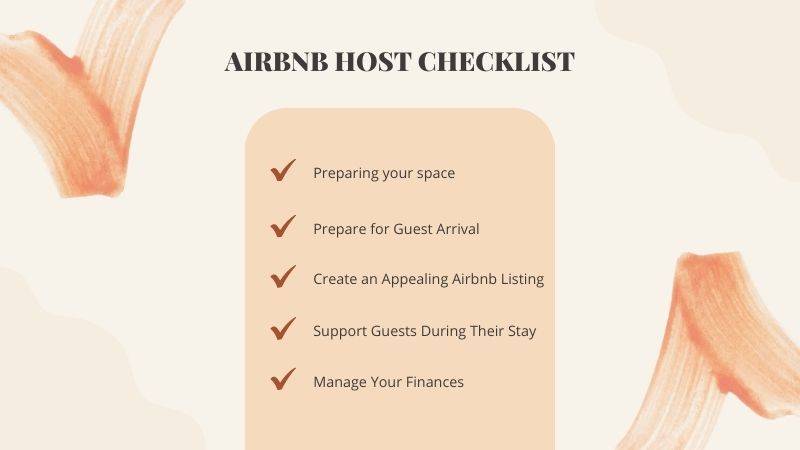
As an Airbnb host, your primary responsibility is to ensure your guests have a comfortable stay. To ensure you are fully prepared, you must follow an Airbnb checklist. Here are some essential items that should be on your list. Set up your space 1. Before accepting guests, you must ensure your space is ready. Here’s a list of things you should do: To-Do List Items Clean and declutter your space Provide fresh linens, towels, and blankets Ensure all appliances are in good working condition Have a smoke detector and carbon monoxide detector installed Have a fire extinguisher installed Have a first aid kit available Provide basic amenities like soap, shampoo, and toilet paper Secure any valuable items Create an Airbnb listing 2. Your listing is your guests’ first impression of your space, so it’s essential to make it look appealing. Here are some things you should consider: To-Do List Items Write a detailed description of your space Provide high-quality photos Set a competitive price Create a catchy title Provide straightforward check-in and check-out instructions Highlight any unique features of your space Respond to inquiries and booking requests promptly Prepare for guest arrival 3. Once you have a booking, you must ensure you’re prepared for your guests’ arrival. Here are some things you should do: To-Do List Items Confirm the booking details with your guest Provide your guest with detailed directions to your space Arrange for crucial exchange or self-check-in Provide your guest with a welcome message or guidebook Stock your kitchen with basic supplies like coffee and tea Provide your guest with a map of the area Ensure there is parking available if necessary During the guest’s stay 4. During your guest’s stay, you should be available to answer any questions they may have. Here are some things you should do: To-Do List Items Be open to answering questions via phone or messaging Respond to any issues or complaints promptly Provide your guests with local recommendations Respect your guest’s privacy Provide clean towels and linens upon request Ensure your space is clean and tidy Address any maintenance issues as soon as possible In addition to the items mentioned above, here are some other essential things to keep in mind when hosting on Airbnb: After the guest’s stay 5. After your guest’s stay, it’s essential to follow up to ensure they had a good experience. Here are some things you should do: To-Do List Items Send your guest a message thanking them for their stay Encourage your guest to leave a review Leave a review for your guest Check your space for any lost items Restock any supplies that were used Schedule a deep cleaning if necessary Update your Airbnb calendar and availability Set clear rules and guidelines 6. It’s essential to set clear rules and guidelines for your guests to follow. Here are some things you should consider: To-Do List Items Specify your check-in and check-out times Establish quiet hours Set rules for smoking, pets, and parties Provide information about your neighbourhood Restock any supplies that were used Give instructions for using appliances and electronics Specify the maximum number of guests allowed Manage your finances 7. Managing your finances is a crucial part of being an Airbnb host. Here are some things you should do: To-Do List Items Set your pricing and adjust it based on the demand Calculate and collect taxes, if applicable Track your income and expenses Keep receipts for any business expenses Consult with a tax professional to ensure compliance Be prepared for emergencies 8. Emergencies can happen, so it’s essential to be prepared. Here are some things you should do: To-Do List Items Have a plan for dealing with emergencies Provide your guests with emergency contact information Know the location of the nearest hospital and urgent care Have a backup plan for key exchange or self-check-in Have spare keys available In conclusion, successful Airbnb hosting requires attention to detail and thorough preparation. By following this Airbnb host checklist, you can create a comfortable and enjoyable experience for your guests while protecting your interests as a host. Happy hosting! You may also like: Star Rating Guidance for STR Guests (Airbnb, VRBO) Modern Floral Tropical – AIRBNB Welcome Guide
Unlock Your Airbnb’s Potential: 40 Creative Ways to Boost Your Income and Delight Your Guests

Managing an Airbnb property requires providing guests with a seamless experience that incorporates technology, and this can be achieved by investing in smart home devices. In this article, we will explore the best smart home devices that can make hosting guests an effortless experience.
Airbnb’s Service Animal Policy: A Comprehensive Guide for Hosts and Guests

Introduction Are you planning to book an Airbnb with your service animal? This article will help you understand Airbnb’s service animal policy and answer all questions. We’ll discuss the definition of a service animal, the responsibilities of both hosts and guests and how to handle disputes. What is a Service Animal? Before diving into Airbnb’s service animal policy, it’s essential to understand the definition of a service animal. According to the Americans with Disabilities Act (ADA), a service animal is a dog that has been individually trained to do work or perform tasks for the benefit of an individual with a disability. These tasks may include guiding people who are blind, alerting people who are deaf, pulling a wheelchair, alerting and protecting a person who is having a seizure, and more. In some cases, miniature horses may also be considered service animals under specific ADA guidelines. However, emotional support, therapy, and companion animals are not considered service animals. Airbnb’s Service Animal Policy: An Overview Airbnb’s service animal policy is designed to comply with the ADA and ensure that people with disabilities have equal access to accommodations. Here’s a summary of the policy: Hosts are required to accept service animals, regardless of whether they allow pets in their listings. Hosts cannot charge extra fees or impose different terms and conditions for guests with service animals. Hosts should provide reasonable accommodations for service animals, including sufficient space and access to necessary facilities. Guests are responsible for their service animals’ behaviour and must ensure they do not threaten others or cause significant property damage. Guests should communicate with their hosts about their service animal before booking to ensure a smooth and hassle-free stay. Hosts’ Responsibilities As a host, it’s crucial to understand your responsibilities when it comes to accommodating guests with service animals. Here are some essential points to keep in mind: Acceptance of service animals: You must accept service animals in your Airbnb, regardless of whether you allow pets. This is a legal obligation under the ADA. No extra fees: You cannot charge additional fees or impose different terms and conditions for guests with service animals, as this would be considered discrimination. Reasonable accommodations: You should provide reasonable accommodations for the service animal, such as adequate space and access to necessary facilities. Respect guests’ privacy: While being curious is natural, you should avoid asking invasive questions about a guest’s disability. You may ask if the animal is required due to a disability and what tasks the animal has been trained to perform. Guests’ Responsibilities If you’re a guest planning to stay at an Airbnb with your service animal, it’s essential to be aware of your responsibilities: Communication: Inform your host about your service animal before booking to ensure they can provide the necessary accommodations. Documentation: Although hosts cannot require documentation as proof that an animal is a service animal, it’s a good idea to have any relevant paperwork handy in case of disputes. Control and behaviour: You are responsible for your service animal’s behaviour and must ensure it does not threaten others or cause significant property damage. Cleanliness: As with any guest, keeping your Airbnb space clean and tidy is essential, including properly disposing of your service animal’s waste. Supervision: Always keep your service animal under control and supervised while staying at an Airbnb. If you need to leave your service animal alone in the rental, inform your host and make appropriate arrangements to ensure the animal’s safety and comfort. Handling Disputes and Issues Despite the best intentions, disputes and issues may arise between hosts and guests regarding service animals. Here are some tips on how to handle such situations: Communication: Open and respectful communication is essential. If you’re a guest and feel discriminated against, calmly explain your rights under the ADA and Airbnb’s service animal policy. If you’re a host and have concerns about a service animal’s behaviour or the guest’s responsibility, respectfully discuss your concerns with the guest. Documentation: Documentation related to the service animal (such as training certificates or identification cards) can help resolve disputes, although it’s not required by law. Contact Airbnb: If a dispute cannot be resolved between the host and guest, contact Airbnb’s support team for assistance. They can help mediate the situation and ensure that both parties are treated fairly. Report discrimination: If you believe you have experienced discrimination due to your service animal, you can file a complaint with the U.S. Department of Justice or your local fair housing agency. Conclusion Airbnb’s service animal policy aims to provide equal access to accommodations for guests with disabilities while respecting hosts’ rights and concerns. By understanding and following this policy, hosts and guests can work together to create an inclusive, comfortable, and enjoyable experience for all parties involved. Remember, communication is key – discussing your needs and expectations as a host or guest can help prevent misunderstandings and ensure a smooth and hassle-free stay. You may also like to read, Mastering Airbnb Check-In Time: A Comprehensive Guide for Hosts and Guests Dealing with an Airbnb Guest Who Won’t Leave: A Comprehensive Guide for Hosts
Mastering Airbnb Check-In Time: A Comprehensive Guide for Hosts and Guests

Introduction Airbnb check-in times are a crucial aspect of the short-term rental experience for hosts and guests. As a host, setting the right check-in time can help you manage your property efficiently, while as a guest, understanding the process can ensure a smooth and stress-free stay. This article will provide a comprehensive guide to Airbnb check-in times, including how to set expectations, communicate with guests, and use technology to streamline the process. Understanding Airbnb Check-In Time Check-in time is the earliest time a guest can access the rental property on arrival. Hosts set their preferred check-in times, considering factors such as cleaning schedules, guest needs, and local regulations. Hosts need to strike a balance between offering flexibility and maintaining control over their property. Setting Check-In Time: Tips for Hosts As a host, you have the freedom to set your check-in time according to your preferences and needs. Here are some tips for determining the ideal check-in time for your Airbnb property: Consider cleaning schedules: Ensure you have enough time between check-outs and check-ins to clean and prepare the property. This may require coordinating with your cleaning service or adjusting your check-out time accordingly. Be realistic: Set a check-in time that you can consistently meet, avoiding overly ambitious or restrictive times that may cause stress or inconvenience for you and your guests. Account for guest needs: Consider the typical arrival times of your guests. For example, offer earlier check-in times to accommodate travellers if your property is near an airport or train station. Local regulations: Be aware of any local rules or restrictions that may affect check-in times, such as noise ordinances or building access rules. Communicating Check-In Time: Tips for Hosts and Guests Effective communication is vital for ensuring a smooth check-in process. Here are some tips for both hosts and guests: Include check-in time in your listing: As a host, be sure to clearly state your check-in time in your Airbnb listing so guests are aware of it before booking. Communicate before arrival: Reach out to your guests a few days before their arrival to confirm their check-in time and provide any necessary instructions. Be responsive: As a guest, keep your host informed of your arrival time and notify them promptly of any changes or delays. Discuss special requests: If you need to request an early or late check-in, communicate with your host in advance to see if they can accommodate your needs. Streamlining Check-In with Technology Technology can help simplify the check-in process for both hosts and guests. Here are some tools and features that can improve the check-in experience: Self-check-in options: Consider offering self-check-in options, such as electronic locks or lockboxes, to provide guests with a flexible and convenient way to access your property. Airbnb’s Check-in Guide: Use Airbnb’s Check-in Guide feature to provide guests with detailed instructions and photos, helping them navigate the check-in process seamlessly. Messaging apps: Utilize messaging apps, such as Airbnb’s in-app messaging or WhatsApp, to communicate with guests in real-time and address any questions or concerns during check-in. Smart home devices: Employ smart home devices, such as video doorbells or smart locks, to monitor and manage access to your property remotely. Handling Late or Early Check-Ins There may be times when guests arrive earlier or later than the scheduled check-in time. Here’s how hosts and guests can handle these situations: Plan for the unexpected: As a host, have a plan for early or late arrivals, such as providing instructions for self-check-in or designating a secure place to store luggage. Communicate changes: If you’re a guest and your arrival time changes, inform your host as soon as possible so they can make any necessary adjustments. Be flexible: Hosts should try to be as accommodating as possible within reason, while guests should understand that hosts may have other commitments or constraints that limit their flexibility. Offer alternative solutions: If a guest requests an early check-in and it’s not feasible, consider recommending nearby cafes, restaurants, or attractions where they can spend time until the property is ready. Charge additional fees (if necessary): As a host, you may charge an additional fee for late check-outs or early check-ins to cover any extra costs, such as additional cleaning or staff time. Be sure to communicate this policy clearly in your listing and with your guests. Check-Out Time and Turnaround In addition to managing check-in times, it’s essential to consider check-out times and the turnaround process: Set a reasonable check-out time: Similar to setting a check-in time, determine a time that provides enough time to clean and prepare the property for the next guest. Communicate check-out time: Clearly state the check-out time in your listing and remind guests of it during their stay. Offer flexible check-out options: Consider offering flexible check-out options, such as late check-out or luggage storage, to accommodate guests with varying departure schedules. Establish a cleaning routine: Develop an efficient cleaning routine or work closely with your cleaning service to ensure a seamless turnaround process between guests. Conclusion Managing Airbnb check-in times effectively is crucial for providing a positive experience for both hosts and guests. By setting reasonable check-in times, communicating clearly, and using technology to streamline the process, hosts can create a welcoming environment for their guests. Meanwhile, guests who stay informed and maintain open communication with their hosts can enjoy a hassle-free check-in experience. Flexibility and understanding go a long way in ensuring a smooth check-in process. Hosts and guests can make the most of their Airbnb stays by working together and following these guidelines. You may also like, Dealing with an Airbnb Guest Who Won’t Leave: A Comprehensive Guide for Hosts Furnishing Your Airbnb Property: A Comprehensive Amenities and Furnishings List Mastering the Art of Dealing with Difficult Airbnb Guests: Tips and Strategies How to Start Airbnb Business in 2023 – The Ultimate Guide
Dealing with an Airbnb Guest Who Won’t Leave: A Comprehensive Guide for Hosts
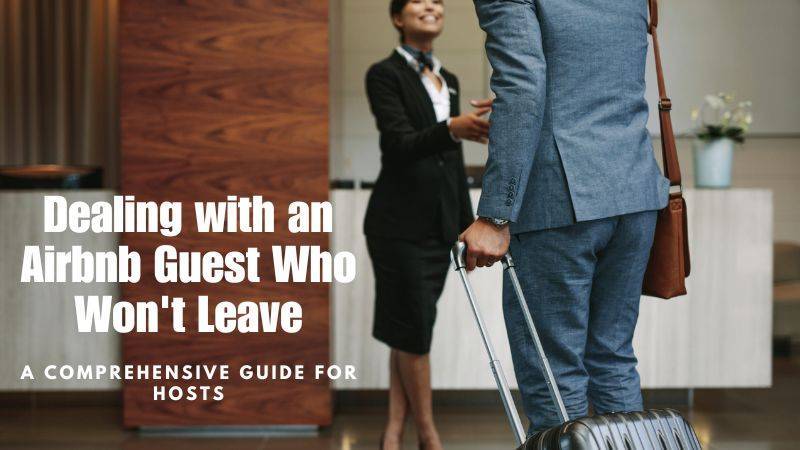
Introduction As an Airbnb host, you may encounter various challenges when renting out your property. One of the most concerning situations is when a guest refuses to leave after their reservation has ended. In this comprehensive guide, we’ll explore how to handle such situations, including prevention strategies, legal considerations, and the steps you can take to resolve the issue effectively. Preventing Issues with Overstaying Guests Prevention is always the best approach when it comes to Airbnb hosting. Here are some steps you can take to minimise the risk of having a guest overstays their reservation: Thoroughly screen guests: Before accepting a booking, review the guest’s profile, ratings, and reviews from previous hosts to gauge their reliability. Set clear expectations: In your listing, outline your house rules, check-in and check-out times, and any fees or penalties for overstaying. Reiterate these details in your communication with guests before and during their stay. Maintain open communication: Stay in touch with your guests throughout their stay to address any concerns or issues that may arise. Encourage them to contact you if they need to extend their reservation, and let them know if you can accommodate their request. Send check-out reminders: A friendly reminder to your guests a day or two before their check-out date reiterates the check-out time and procedures. Legal Considerations for Overstaying Guests Understanding the legal implications of a guest who refuses to leave your property is essential. Laws regarding tenant rights and eviction processes vary by jurisdiction, so it’s crucial to familiarise yourself with the regulations in your area. Tenancy laws: In some cases, an overstaying guest may be considered a tenant under local laws, which can complicate eviction. To avoid this, ensure your rental agreement clearly states that the guest’s stay is temporary and not intended to create a landlord-tenant relationship. The eviction process: If you need to evict an overstaying guest, you must follow the legal eviction process in your jurisdiction. This may involve providing written notice, filing an eviction lawsuit, or involving law enforcement. Steps to Take When a Guest Won’t Leave If you find yourself in a situation where a guest refuses to leave your property, follow these steps to resolve the issue: 1. Communicate with the guest: Reach out to the guest to understand their reasons for overstaying and remind them of their check-out date and time. In some cases, the guest may have simply misunderstood the check-out procedures or encountered an unexpected issue, which can be resolved through communication. 2. Offer a solution: If the guest needs to extend their stay and you can accommodate them, offer to extend their reservation through the Airbnb platform. Alternatively, if you cannot host them for an extended period, suggest nearby accommodations where they can book a new reservation. 3. Contact Airbnb: If the guest still refuses to leave, contact Airbnb’s customer support to inform them of the situation. They can help mediate the issue and assist with rebooking the guest elsewhere or cancelling their reservation. 4. Document the situation: Record all communication with the guest and any evidence of their refusal to leave, such as photos or videos. This documentation may be necessary if legal action is required. 5. Consult with a legal professional: If the guest continues to refuse to leave your property, consult with a legal professional to determine your rights and the appropriate eviction process in your jurisdiction. 6. Follow the eviction process: If necessary, initiate the legal eviction process according to the regulations in your area. This may involve providing the guest with a written notice to vacate, filing an eviction lawsuit, or involving law enforcement. Remember that the eviction process can be time-consuming and costly, so it’s crucial to exhaust all other options before resorting to this step. 7. Learn from the experience: After resolving the issue, take the time to review your screening process, rental agreement, and communication practices to identify areas for improvement. Implement changes to minimise the risk of encountering a similar situation. Conclusion Dealing with an Airbnb guest who will stay can be a challenging and stressful experience for hosts. By taking preventive measures, maintaining open communication, and understanding the legal implications, you can better manage such situations and protect your property and rights. Always approach these situations with professionalism and empathy, as there may be genuine reasons behind a guest’s reluctance to leave. However, when necessary, don’t hesitate to involve Airbnb support and legal professionals to ensure a swift resolution. Remember, the key to successful Airbnb hosting is to proactively address potential issues and continuously improve your hosting practices. By doing so, you can create a positive experience for both you and your guests. You may also like, Safeguarding Your Airbnb Against Smoking and Noise Concerns Airbnb Welcome Book : Impress Your Guest
Furnishing Your Airbnb Property: A Comprehensive Amenities and Furnishings List
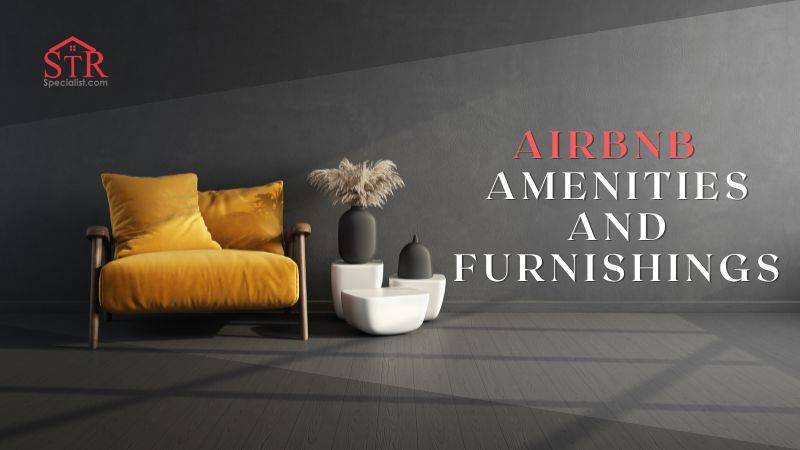
As an expert in managing Airbnb properties, I have created “Furnishing Your Airbnb Property: A Comprehensive Amenities and Furnishings List” to help you set up a successful Airbnb property. This all-inclusive list of amenities and furnishings provides a guideline for outfitting your property, taking into account the number of bedrooms. Use this list to customize your approach based on the size of your property and unique requirements. 1. Living Room: Furniture/Item Quantity per Living Room Additional Information Sofa 1 Consider a sofa bed for additional sleeping space. Armchairs 1-2 Depending on available space. Coffee Table 1 Per living room Side Tables 1 Per living room TV with Streaming 1 Per living room Wi-Fi Router – Ensure strong connectivity throughout the property Floor lamps 1-2 Per living room Decorative Items As desired Artwork, throw pillows, rugs, etc. to create atmosphere. 2. Kitchen: Kitchen Supplies Quantity Additional Information Refrigerator 1 Size appropriate for the property. Stove and Oven 1-2 Size appropriate for the property. Microwave 1 — Dishwasher Optional Consider for larger properties or those with extended stay guests. Coffee Maker 1 — Toaster 1 — Electric Kettle 1 — Cookware Basic Set Pots, pans, baking sheets suitable for various types of cooking. Utensils Basic Set Spatulas, ladles, tongs for cooking and serving. Cutting Board 1-2 — Knives One of each Chef’s knife, paring knife, bread knife. Dishware At least 2 sets Plates, bowls, mugs per guest capacity. Glassware At least 2 sets Drinking glasses, wine glasses per guest capacity. Flatware At least 2 sets Forks, knives, spoons per guest capacity. Mixing Bowls 1 set Of various sizes. Measuring Cups and Spoons 1 set each — Can Opener 1 — Bottle Opener 1 — Colander 1 — Dish Towels 2-4 — Dish Soap, Dishwasher Detergent, and Sponges As needed — Trash Can with Bags 1 For the kitchen. 3. Bedrooms (quantities are per bedroom): Bedroom Supplies Quantity Additional Information Bed 1 Choose an appropriate size (e.g., twin, full, queen, king) based on room size and target guests. Mattress Protector 1 One per bed. Pillows 2 per guest Provide both firm and soft options. Bed Linens 2 sets per bed Sheets, pillowcases. Blankets 1-2 per bed Depending on the climate. Comforter or Duvet with Cover 1 per bed — Bedside Tables 1-2 per bedroom Depending on space. Bedside Lamps 1 per bedside table — Alarm Clock 1 per bedroom Preferably with USB charging ports. Closet with Hangers At least 1 per bedroom 10-15 hangers per guest. Full-Length Mirror 1 per bedroom or common area — Blackout Curtains or Blinds As needed Especially for rooms with significant external light. Decorative Items As desired Artwork, rugs, etc. to create a welcoming atmosphere. 4. Bathrooms (quantities are per bathroom): Bathroom Supplies Quantity Additional Information Shower Curtain and Liner 1 per bathroom For bathrooms with shower/tub combinations. Bath Mat 1 per bathroom — Towels 2 sets per guest capacity Bath towels, hand towels, washcloths. Toilet Paper At least 2 rolls per bathroom — Plunger 1 per bathroom — Trash Can with Bags 1 per bathroom — Hand Soap 1 — You may also like, How to Set Airbnb Rates: A Comparison of Pricing Strategies Rankbreeze Review: Elevate Your Airbnb Business with Data-Driven Insights How To Export Airbnb iCal Calendar & Sync With Other Websites To Avoid Double Bookings Airbnb Do’s and Don’ts – All Hosts Should Know
Mastering the Art of Dealing with Difficult Airbnb Guests: Tips and Strategies

As an Airbnb host, you will encounter demanding guests at some point in your hosting journey. In “Mastering the Art of Dealing with Difficult Airbnb Guests: Tips and Strategies,” we explore various challenging guests and provide valuable insights on handling them professionally, ensuring your Airbnb business remains unscathed. In this article, we will discuss practical tips to tackle difficult situations, fostering a positive Airbnb hosting experience for all involved. Stay Calm and Professional Dealing with a difficult guest can be frustrating, but it is essential to remain calm and professional when communicating with them. Avoid responding to their behavior with aggression or defensiveness, as this can escalate the situation and make it worse. Instead, remain polite and respectful in your communication, even if the guest is being rude or aggressive. Listen and Acknowledge Their Concerns When dealing with difficult guests, it is important to listen to their concerns and acknowledge their feelings. Try to understand their perspective and empathize with their situation. This can help you address the issue effectively and make the guest feel heard and valued. Find a Solution Once you have listened to the guest’s concerns, work with them to find a solution that meets their needs and aligns with your Airbnb hosting policies. In ‘Mastering the Art of Dealing with Difficult Airbnb Guests: Tips and Strategies,’ we emphasize the importance of clear and transparent communication, explaining your reasoning behind any decisions you make. This approach can help build trust and understanding between you and the guest, fostering a positive resolution to any challenges. Set Boundaries While it is important to be accommodating to guests, it is also important to set boundaries to protect yourself and your Airbnb business. If a guest is being unreasonable or violating your hosting policies, politely but firmly let them know what is and isn’t acceptable behavior. This can help prevent any further issues and maintain a professional hosting environment. Document Everything In case of any disputes, it is important to document everything that happens during the guest’s stay. This includes communication with the guest, any incidents or damages that occur, and any actions taken to resolve the issue. This documentation can be used as evidence if you need to escalate the situation to Airbnb’s customer support team. Know When to Involve Airbnb If you cannot resolve the issue with the guest on your own, don’t hesitate to involve Airbnb’s customer support team. They can provide assistance and help mediate the situation to find a resolution that works for both you and the guest. In conclusion, dealing with demanding guests is a challenging but necessary part of running an Airbnb business. By staying calm and professional, listening to their concerns, finding a solution, setting boundaries, documenting everything, and involving Airbnb’s customer support team when necessary, you can maintain a positive hosting experience and build a successful Airbnb business. You may also like, Safeguarding Your Airbnb Against Smoking and Noise Concerns How to Make Your Short-term Rental More Environmentally Friendly
How to Set Airbnb Rates: A Comparison of Pricing Strategies
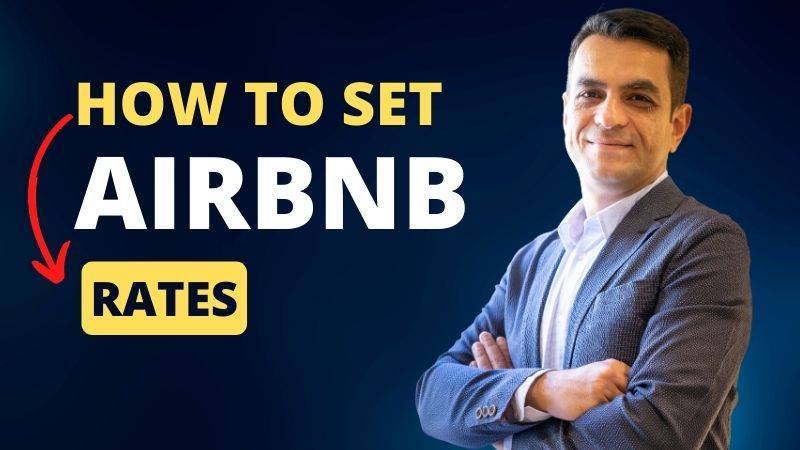
As an Airbnb host, one of the critical factors in running a successful business is setting the correct rental rate for your property. There are several methods to determine the ideal pricing strategy, including Airbnb Smart Pricing, manually setting the rates, and using specialist dynamic pricing software like Beyond Pricing. This guide will discuss these three options, evaluate their pros and cons, and help you choose the best approach for your Airbnb business. 1. Airbnb Smart Pricing: Airbnb Smart Pricing is an automated pricing system provided by Airbnb that considers factors such as demand, location, amenities, and other aspects of your listing to suggest a competitive nightly rate. Pros: Easy to set up and requires minimal effort to maintain. Based on Airbnb’s comprehensive data analysis suggests prices that are competitive in your market. Automatically adjusts the prices based on factors like seasonality and demand. Cons: It may not be as accurate as other methods, particularly for unique or niche properties. Limited customization options may not allow you to consider your specific business goals or costs. Potentially lower revenue, as the system tends to focus on keeping your property booked rather than maximizing profits. 2. Manually Setting Rates: Manually setting your rates involves conducting your research and analysis to determine the optimal nightly rate for your property. Pros: Complete control over your pricing strategy, allowing you to consider factors specific to your property and business goals. Ability to capitalize on local events or trends by adjusting your rates accordingly. You can yield higher revenues if you deeply understand your market and your property’s unique value. Cons: Time-consuming and requires consistent monitoring and research to stay competitive. Risk of underpricing or overpricing your property due to lack of market data or misinterpreting trends. This may lead to missed opportunities for revenue optimization during high-demand periods or special events. 3. Specialist Dynamic Pricing Software (e.g., Beyond Pricing): Specialist dynamic pricing software, such as Beyond Pricing, uses advanced algorithms and extensive market data to provide tailored pricing suggestions for your Airbnb property. Pros: More accurate and data-driven pricing suggestions compared to Airbnb Smart Pricing, considering a more comprehensive range of factors. Customization options allow you to input your specific business goals and costs for better-aligned pricing recommendations. Dynamic pricing means your rates automatically adjust based on real-time market conditions, maximizing revenue potential. Cons: Subscription costs for using the software can be a financial burden, especially for small-scale hosts. Understanding and utilizing the software’s features may require some learning curve. Reliance on third-party software means you have less direct control over your pricing strategy. Choosing the right way i.e. how to set Airbnb rates for your property depends on your needs, goals, and resources. If you prefer a hands-off approach and are willing to accept potentially lower revenues, Airbnb Smart Pricing could be a suitable option. Conclusion If you have the time and expertise to conduct market research and make informed decisions, manually setting your rates might be the way to go. However, if you are looking for a data-driven, dynamic, and customized pricing strategy that maximizes revenue potential, specialist dynamic pricing software like Beyond Pricing is likely your best bet. To make the most informed decision, consider the following factors: Your level of expertise in market analysis and pricing strategy. The amount of time you can dedicate to managing your property’s pricing. Your financial resources and willingness to invest in pricing software. Your property’s unique characteristics and how they fit within the local market. Your short-term and long-term business goals, including occupancy rates and revenue targets. By carefully weighing these factors, you can determine your Airbnb property’s most suitable pricing strategy, ensuring a successful and profitable hosting experience. Try Beyond Pircing FREE for 14 days Also read Rankbreeze review, the software for data driven insights
Rankbreeze Review: Elevate Your Airbnb Business with Data-Driven Insights
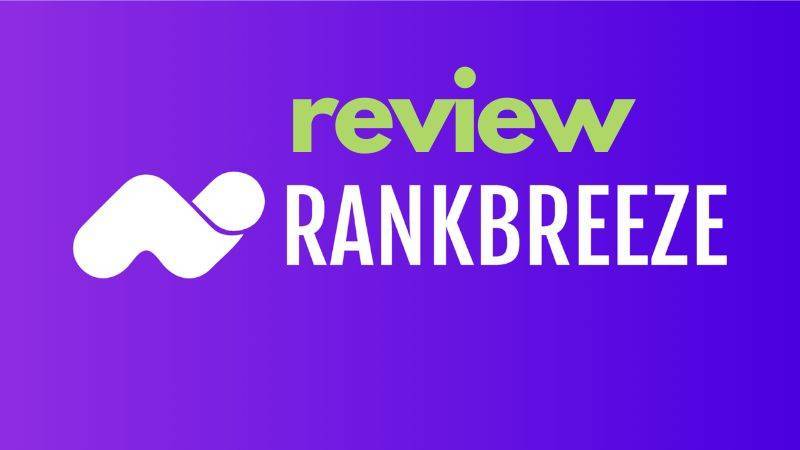
As an Airbnb property management expert, many hosts struggle with optimizing their listings to attract more bookings and drive revenue. Countless factors influence a listing’s performance, making it challenging to pinpoint the exact changes that need to be made. That’s where Rankbreeze comes in. In this article, I will review Rankbreeze, a robust platform that offers data-driven services to help Airbnb hosts stay ahead of the competition. What is Rankbreeze? Rankbreeze is a comprehensive analytics and optimization platform for Airbnb hosts, property managers, and vacation rental owners. It provides valuable insights and actionable data to improve listings, enhance visibility, and maximize revenue. By monitoring key performance indicators (KPIs), Rankbreeze allows hosts to understand their current market position and make informed decisions to propel their business to new heights. Services Offered by Rankbreeze Rank Tracking: It tracks your listing’s position on Airbnb’s search results, enabling you to monitor fluctuations and identify trends. This information helps hosts optimize their listing’s performance and ensure it remains visible to potential guests. Competitor Analysis: it allows you to analyze your competition by comparing your listing’s performance to similar properties in your area. This feature helps you identify areas of improvement and opportunities to stand out from the competition. Market Analysis: Rankbreeze provides a detailed analysis of your local market, including average daily rates, occupancy rates, and booking lead times. This information is invaluable for pricing your property competitively and capitalizing on market trends. Calendar Optimization: It’s advanced calendar tool helps you identify gaps in your booking calendar and recommends pricing adjustments to encourage last-minute bookings. This feature allows hosts to maximize their occupancy and revenue. Automated Reports: It offers customizable reports that provide detailed information on your listing’s performance. These reports allow hosts to monitor their progress and make data-driven decisions. How Rankbreeze Adds Value to Hosts Data-Driven Decisions: It offers hosts a wealth of data that enables them to make informed decisions based on real-time market trends. This level of insight empowers hosts to optimize their pricing, occupancy, and overall listing performance. Time Savings: By providing automated reports and actionable insights, Rankbreeze saves hosts the time and effort required to analyze their listing’s performance manually. This allows hosts to focus on delivering an exceptional guest experience and growing their business. Increased Revenue: It’s advanced optimization tools help hosts identify areas of improvement and capitalize on market trends, leading to increased bookings and higher revenue. Competitive Advantage: With its competitor analysis and market insights, hosts can stay ahead of the competition and adapt their strategy to maintain a strong market presence. Ongoing Support: It offers dedicated customer support to ensure hosts can access expert guidance and advice. This support is crucial in helping hosts navigate the ever-changing vacation rental landscape. Pros and Cons of Rankbreeze.com Pros: Data-Driven Insights: Rankbreeze provides valuable data-driven insights that help hosts make informed decisions about pricing, occupancy, and overall listing performance. This empowers hosts to optimize their listings and capitalize on market trends. Comprehensive Analytics: It offers various analytics tools, including rank tracking, competitor analysis, market analysis, and calendar optimization. These features enable hosts to gain a deep understanding of their listing’s performance and the competitive landscape. Time-Saving Automation: It’s automated reports and actionable insights save hosts the time and effort required to analyze their listing’s performance manually. This allows hosts to focus on other aspects of their Airbnb business, such as guest experience and property maintenance. Increased Revenue Potential: By helping hosts identify areas of improvement and capitalize on market trends, Rankbreeze’s optimization tools can lead to increased bookings and higher revenue. Dedicated Customer Support: It offers responsive customer support, ensuring hosts can access expert guidance and advice when needed. This can be crucial in helping hosts navigate the ever-changing vacation rental landscape. Cons: Subscription Cost: Rankbreeze’s services come with a monthly subscription fee, which may be a barrier for some hosts, especially those with a limited budget or smaller-scale operations. Learning Curve: Although it is designed to be user-friendly, some hosts may find navigating the platform and fully utilizing its features initially challenging. It may take time to become comfortable with the interface and understand how to make the most of the available tools. Limited Platform Support: It is currently focused on Airbnb listings, meaning hosts with properties on other vacation rental platforms (e.g., VRBO, Booking.com) may not benefit from the full range of services offered. Market Variability: While it provides valuable market insights, it’s important to remember that the vacation rental market can be volatile, and external factors (e.g., economic conditions and travel restrictions) may impact a listing’s performance, regardless of optimization efforts. No Guarantee of Success: While Rankbreeze offers valuable tools and insights to help hosts optimize their listings, there is no guarantee of success. Ultimately, hosts must put in the effort to implement changes and adapt their strategies based on the data provided. In conclusion, Rankbreeze is a robust platform that offers Airbnb hosts a comprehensive suite of analytics and optimization tools to enhance their listings and maximize revenue. By providing data-driven insights, actionable recommendations, and ongoing support, Rankbreeze empowers hosts to make informed decisions and stay ahead of the competition. While there are some limitations, such as subscription cost and platform focus, the overall benefits and potential for increased bookings and revenue make Rankbreeze a valuable investment for hosts looking to elevate their Airbnb business and achieve long-term success. Try Rankbreeze for 7 days Also read 30 Actionable tips to optimize Airbnb listing
Safeguarding Your Airbnb Against Smoking and Noise Concerns

The upsurge in short-term rentals has undeniably revolutionised the travel industry. Yet there have been difficulties along the way with this shift. In this article, we will focus on how to “safeguard your Airbnb against smoking and noise concerns”, two common problems faced by rental owners. One of the challenges that rental owners face is the issue of unruly renters who disregard property rules and policies, despite stringent regulations set by platforms like Airbnb. Additionally, local governments have imposed increased taxes on properties used for short-term rentals, while some homeowner associations have altogether banned rentals within their communities. Strategies for Addressing Smoking and Noise Concerns in Your Airbnb: Consider the following recommendations: Clearly articulate your house rules in the listing. Reinforce the rules to guests prior to their stay. Invest in conspicuous devices that detect smoke and excessive noise. Inform guests about these devices to deter unwanted behaviours before they occur. 1. Sample Airbnb House Rules for Preventing Smoking and Noise Issues: When it comes to “Safeguarding Your Airbnb Against Smoking and Noise Concerns,” short-term rental owners often need to be more careful with inconsiderate guests who flout house rules and platform policies, such as those pertaining to smoking, parties, and excessive noise. These transgressions can lead to property damage and neighbour complaints, forcing owners to file insurance claims, repair damages, and establish renter accountability. 2. Innovative Solutions for Smoke and Noise Prevention in Your Airbnb: Companies like WYND have developed cutting-edge tools to safeguard short-term rental properties from troublesome renters. WYND’s Sentry is a monitoring device capable of detecting and identifying cigarette smoke and excessive noise. Its sensor technology enables owners to remotely oversee their properties, proactively address disturbances, and document incidents for claim purposes. Its smoke detection feature recognizes cigarette, vape, and marijuana smoke, alerting owners in real time. This functionality empowers property owners to address issues immediately or gather evidence for insurance claims. What is Sentry? This one is the first non-intrusive cigarette smoke and loud noise detector in the world to safeguard your rental property (Airbnb, VRBO). Be immediately informed about unwelcome smoking, gatherings, and other environmental concerns. It is an innovative solution for property owners seeking to protect their rental investments from potential damage and disturbances caused by smoking or loud gatherings. By providing real-time notifications and non-intrusive monitoring, Sentry empowers property owners to address issues promptly and maintain a safe and comfortable environment for their guests. Stop Smokers Fast Renters and Airbnb hosts pay an average of $1,600 in smoking damage claims. To stop unintentional smoking before it causes harm, Sentry airIDTM technology identifies smoke from cigarettes, marijuana, cigars, and e-cigarettes with > 99% accuracy. *Validated by the University of Illinois, Chicago*Does not specify which type of recreational smoke*Vape detection pending Another common policy violation is the “no parties” rule. Its noise detection capability notifies owners if it detects more guests than registered at the property. This information can serve as evidence for insurance payouts and platform rule enforcement, as well as allow owners to inform neighbors and forestall complaints or further escalations. Stop the Party Before the Noise Complaint Using market-leading SiSonicTM MEMS technology, keep an eye on noise levels to avoid parties, damage, and neighbour complaints. Without invading your visitors’ privacy, get warnings when there is persistent noise on your property. Sentry’s advanced features make it an invaluable tool for short-term rental owners seeking instant and precise data on noise and smoking concerns. It not only facilitates problem resolution but also provides necessary evidence for insurance payouts and platform rule enforcement. With annual and monthly payment options, Sentry may soon become an indispensable investment for short-term rental proprietors. Sentry’s Tamper Protection and Alerts: Enhanced Security for Your Rental Property It’s advanced monitoring system not only detects cigarette smoke and loud noise but also offers robust tamper protection and alerts to ensure the continuous safeguarding of your rental property. Sentry’s tamper protection features, including notifications for internet and power disconnection, as well as its battery backup capabilities. Tamper Protection Features: a. Internet disconnection notification: Sentry monitors its connection to the internet and sends a notification to the property owner if it becomes disconnected. This alert ensures that the property owner is aware of any potential attempts to tamper with the system or if there is an issue with the internet connection. b. Power disconnection notification: If Sentry’s power supply is interrupted, the property owner receives an immediate notification. This feature allows property owners to address any intentional or unintentional power disconnections that may compromise the monitoring system’s effectiveness. c. Battery backup: Sentry is equipped with a built-in battery that can last for over 48 hours after a power disconnection. This backup system ensures continuous monitoring and protection of your rental property even during power outages or tampering attempts. Benefits of Tamper Protection and Alerts: a. Enhanced security: Sentry’s tamper protection features provide an additional layer of security, ensuring that the monitoring system remains active and effective even in the face of potential tampering or technical issues. b. Immediate awareness: Real-time notifications for internet and power disconnection enable property owners to take swift action in resolving connectivity issues or addressing potential tampering attempts. c. Uninterrupted monitoring: Sentry’s battery backup ensures continuous monitoring of your rental property, maintaining protection during power outages or other disruptions. d. Increased peace of mind: With Sentry’s tamper protection features, property owners can rest assured that their investment is safeguarded around the clock. Stay Safe! You may also like: How can you negotiate prices on Airbnb? Airbnb Welcome Book : Impress Your Guest AirDNA Review: Is It Really The Bible For Airbnb? And Is It Worth The Money?
Houst: The Unrivaled Airbnb Property Management Company

Airbnb has revolutionized the way people travel and experience accommodations around the world. This home-sharing platform has enabled property owners to generate passive income while providing travellers with unique and comfortable places to stay. With the growing number of Airbnb listings, property management companies have emerged to help hosts optimize their listings and streamline operations. Among these companies, Houst stands out as the best in the industry, offering unparalleled services and support. In this article, we will explore why Houst has become the go-to Airbnb property management company for hosts worldwide. 1. Comprehensive Service Offerings One of the primary reasons for Houst’s success is its extensive range of services, catering to every aspect of Airbnb hosting. Houst covers everything from listing optimization and pricing strategy to guest communication and property maintenance. By providing all these services under one roof, Houst simplifies the process for hosts and ensures a seamless experience for guests. 2. Expertise in Local Market Houst’s deep understanding of local markets enables them to make well-informed decisions when managing properties. Their teams of local experts keep a close eye on market trends and use data-driven insights to optimize pricing strategies, ensuring that hosts maximize their profits while maintaining competitive rates for guests. 3. Advanced Technology Integration Houst leverages cutting-edge technology to streamline operations and enhance the guest experience. Their user-friendly platform allows hosts to access their property’s performance data, manage bookings, and communicate with guests effortlessly. Houst also employs sophisticated algorithms to optimize listing visibility and pricing, ensuring that properties are always up-to-date with market trends and demands. House Operation Areas 4. Exceptional Guest Experience Houst prioritizes providing an outstanding experience for guests, which translates into positive reviews and increased bookings for hosts. They handle all guest communications professionally, promptly responding to inquiries and resolving any issues that may arise. Their in-house cleaning and maintenance teams ensure that properties are impeccably maintained, creating a comfortable and welcoming environment for guests. 5. Customized Solutions Recognizing that every host has unique needs and preferences, Houst offers customized solutions tailored to individual requirements. They provide flexible service packages, allowing hosts to select the services they need most. This personalized approach ensures hosts receive the best support for their property and hosting goals. 6. Transparent Pricing and No Hidden Fees Houst’s commitment to transparency sets them apart from other property management companies. They offer clear and competitive pricing with no hidden fees or surprise charges. Hosts can easily understand the cost of Houst’s services and make informed decisions about which options are best for their property. 7. Continuous Support and Education Houst doesn’t just manage properties; they also provide ongoing support and education for hosts. They offer valuable resources, such as blog articles and webinars, to help hosts stay informed about industry trends and best practices. Houst also provides dedicated account managers who work closely with hosts to ensure their success and address any concerns. How much does Houst change for property management? Houst generally offers a variety of service packages to cater to different needs. These may include: Pay-per-booking: In this model, Houst charges a percentage of the booking revenue, typically ranging from 10% to 20% or more, depending on the level of service and support provided. Fixed monthly fee: Some hosts may prefer a fixed monthly payment, which provides more predictable costs. The fixed price will depend on the services offered, the location, and the specific property. Customized plans: Houst may also offer customized programs tailored to a host’s needs, with pricing determined based on the selected services. It’s essential to review the specific terms and conditions of Houst’s service offerings in your area to understand the pricing structure and any additional costs that may apply. This will help you choose the best package for your needs and budget. To sum up.. Houst’s comprehensive service offerings, market expertise, technology integration, and commitment to guest satisfaction have made them the best choice for Airbnb property management. Their customized solutions, transparent pricing, and continuous support demonstrate their dedication to helping hosts Click here to find out more about Houst.
Houst: Revolutionizing Airbnb Property Management for the Modern Era

The property management industry has experienced significant transformations in recent years, with technology playing a pivotal role in streamlining processes and improving efficiency. One company that has managed to capture the essence of this change is Houst, a pioneering property management platform redefining how landlords and property owners handle their rental properties. What is Houst? Houst, formerly Airsorted, is a property management company specialising in short-term and long-term rental management. Founded in 2015 by James Jenkins-Yates, Daniel Scott, and Tom Jones, the company aims to make property management hassle-free for property owners by providing a range of services, including listing management, cleaning, and maintenance. Houst’s Growth and Expansion Since its inception, Houst has experienced impressive growth, establishing itself as a leader in the property management sector. With a strong presence in cities worldwide, the company has expanded its services to cater to a wide range of property types and locations. Houst’s success can be attributed to its innovative approach to property management, combining cutting-edge technology with a high level of customer service. Key Features of Houst’s Services Listing Management: Houst helps property owners create compelling listings for platforms like Airbnb, Booking.com, and VRBO. The company handles professional photography, persuasive copywriting, and listing optimization to ensure maximum visibility and bookings. Pricing Optimization: By utilizing advanced algorithms and market data, Houst ensures that rental prices are optimized to maximize revenue while maintaining a competitive edge in the market. Guest Communication and Screening: Houst’s dedicated team handles all guest communication, from initial inquiries to post-stay reviews. The company also performs guest screening to ensure that only reliable and trustworthy tenants are allowed to book the property. Cleaning and Maintenance: Houst offers professional cleaning and maintenance services, ensuring that properties are kept in pristine condition for each guest. This includes linen and towel services, deep cleaning, and regular property inspections. 24/7 Support: Property owners can rely on Houst’s around-the-clock support, which is available to address any issues or concerns that may arise during the rental process. The Future of Property Management As the property management landscape continues to evolve, companies like Houst are at the forefront of embracing new technologies and best practices. By leveraging the power of digital platforms, data analytics, and automation, Houst is well-positioned to meet the demands of property owners in the modern era. Whats next… Houst has emerged as a game-changer in the property management industry, providing property owners with a comprehensive solution that simplifies and streamlines the rental process. With its innovative approach and commitment to customer satisfaction, Houst is poised to continue shaping the future of property management in the years to come. Also read How to negotiate prices on Airbnb
How can you negotiate prices on Airbnb?

Negotiating a price on Airbnb can be a delicate process that requires research, communication, and diplomacy. In this comprehensive guide, I will walk you through the steps involved in negotiating the price of an Airbnb stay and provide tips and strategies to increase your chances of success. 1. Research Comparable Listings: Start by researching similar listings in the area you are planning to visit. Look for properties with comparable amenities, location, and size to the one you’re interested in. This will help you understand the typical price range for accommodations in that area and give you a basis for negotiating a fair price. Use Airbnb’s search filters to find comparable listings. Consider factors such as location, property type, number of bedrooms and bathrooms, and guest capacity. Read reviews to get a sense of the quality of the listings. Take note of the average price range and any patterns, such as higher prices for properties closer to popular attractions. 2. Choose the Right Time to Negotiate: Timing can play a significant role in your success when negotiating on Airbnb. Hosts are more likely to consider lowering their prices during off-peak seasons or when they have upcoming vacancies they need to fill. If possible, plan your trip during the off-season when there is less demand for accommodations. Monitor the availability calendar for the listing you’re interested in. If you notice many open dates close to your desired travel period, the host may be more willing to negotiate. 3. Craft a Polite and Respectful Message: When reaching out to a host, it’s crucial to be polite and respectful in your communication. Keep in mind that hosts are more likely to consider a price negotiation if you establish a friendly rapport and communicate your needs clearly. Introduce yourself and express your interest in the listing. Share some details about your trip, such as the purpose, number of guests, and any special requirements. Be honest about your reasons for requesting a discount (e.g., budget constraints, extended stay, or off-season travel). Express appreciation for their time and consideration. 4. Send an Inquiry, Not a Reservation Request: Instead of submitting a reservation request with your desired price, send an inquiry to the host to discuss the possibility of a special offer. This approach allows you to negotiate without committing to a booking or putting pressure on the host. Use the “Contact Host” option on the listing page to send an inquiry. In your message, ask if the host would be open to discussing a special offer based on your reasons for requesting a discount. Avoid mentioning specific numbers or discounts at this point. 5. Make a Reasonable Offer: If the host is open to negotiating, propose a fair discount based on your research and reasons for requesting a lower rate. Keep in mind that an unrealistically low offer may offend the host or discourage them from engaging in further negotiation. Suggest a discount that aligns with the average price range for comparable listings in the area. Explain how you arrived at the proposed discount and emphasize that you believe it to be a fair offer. Be prepared to justify your offer based on the factors you’ve considered (e.g., off-season travel, longer stay, or budget constraints). 6. Be Flexible and Open to Alternatives: Sometimes, hosts may not be willing or able to lower their nightly rate but may offer other incentives or concessions. Be open to these alternatives, as they may still result in overall savings for your stay. Consider accepting a discount on a more extended stay or a waived cleaning fee. Be prepared to adjust your travel dates or consider alternative listings if the host cannot accommodate your request. 7. Await the Special Offer: If the host agrees to a discount, they will send you a “Special Offer” with the revised pricing. Good luck 🙂 Also read Which is Better Airbnb or Vrbo
Airbnb Welcome Book : Impress Your Guest
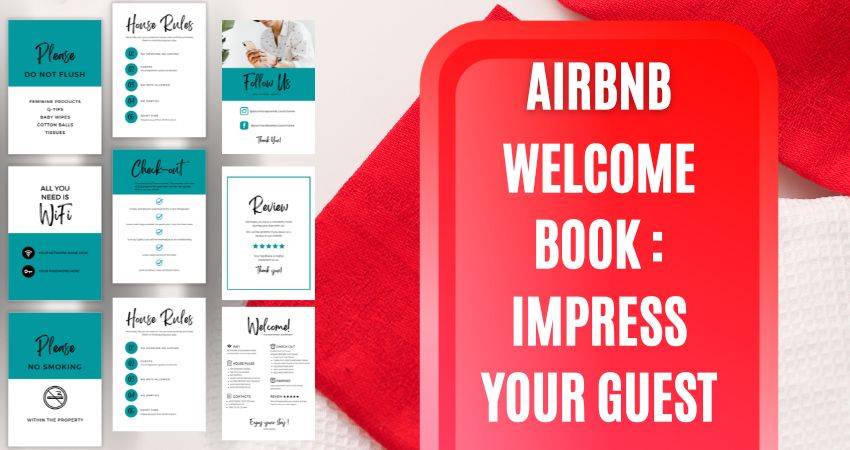
Crafting a thoughtfully designed welcome book that impress your guests and lets you greet your guests warmly, even in your absence. This essential tool helps you establish a positive initial impression and equips your guests with valuable insights about your rental space, ensuring they have a delightful and memorable stay. To create a welcoming atmosphere and facilitate a seamless, worry-free experience for your guests, consider including the following information in your welcome book. Need for an Airbnb Welcome Book The importance of a well-crafted welcome book cannot be overstated. It is an indispensable component of every listing, often serving as the initial point of contact between you and your guests, showcasing your commitment to their comfort and well-being. Consider your Airbnb welcome book a valuable resource, guiding your guests on optimising their stay at your property and encouraging them to treat your home respectfully. Your guests will undoubtedly appreciate your attentive hosting approach by providing essential information for navigating your space and sharing local recommendations for must-visit spots and activities. Bear in mind that Airbnb guests expect a top-notch experience. They desire a sense of home away from home and highly value effective communication. A comprehensive welcome book is just one aspect of meeting these expectations. Responding to their messages and promptly addressing their inquiries is equally essential. Although being available to your guests around the clock can be demanding, utilizing communication automation tools such as Hospitable.com can help streamline interactions and ensure consistent, timely responses. Contents for an Airbnb Welcome Book Incorporating ample details in your welcome book can greatly enhance your guests’ experience. Let’s delve into the essential components to include in your guestbook to leave a lasting impression on your visitors. Welcome Information: Initiate your welcome book with a warm greeting, expressing your delight in hosting them. Include crucial information they need upon arrival, such as: Your contact details and rental property addressEmergency services contact informationFront gate access codeParking specificsWi-Fi passwordCheck-out instructions Even if guests don’t read the entire welcome book, having vital details upfront minimizes calls for assistance. Pro tip: Adding a personal touch, such as a photo and brief introduction about your family, hobbies, pets, and hosting journey, fosters trust and rapport, potentially encouraging repeat bookings. House Rules: Reiterate your house rules from the Airbnb listing and pre-arrival message, ensuring easy access throughout their stay. This helps prevent issues, neighbor complaints, and property damage. Appliance How-To Instructions: Create a detailed troubleshooting section to address potential questions about appliances and electronics, including smart locks, thermostats, washer and dryer, TV remote, air conditioner, kitchen appliances, and Wi-Fi. This saves time and ensures guest comfort. Local Transportation Information: Provide transportation options, particularly for rentals outside city limits. Include bus and train schedules, taxi service contacts, local maps, and car rental information. Local Attractions and Activities: Offer recommendations for a genuine local experience, covering: Tourist attractions (museums, parks, beaches, historical sites) Shopping centers and grocery stores Favorite restaurants and coffee shops Fairs and festivals (farmers’ markets, street fairs, annual events) Nightlife (clubs, bars, casinos, breweries, live music) Pro tip: Create an engaging digital Airbnb guidebook featuring sightseeing, dining, unique shops, and outdoor experiences, complete with photos. You can further enhance your welcome book with information on local weather, helpful phrases for international travelers, and a discount code for direct booking through your website. Hospitable.com offers an easy way to create a vacation rental website and automate 90% of routine management tasks, even without coding expertise. What Kinds of Alternatives Are There? Crafting a basic welcome book on your computer, printing it, and binding it together is sufficient to start. Utilizing online templates can enhance the visual appeal of your book as well. However, if you feel a printed welcome book is too rudimentary for modern times, consider creating an informative video covering essential details for your guests. Upload the video to YouTube as an unlisted file, then share the link with guests who book your rental space. Using Hospitable, you can easily automate the process of sending this link as a message to your guests, providing a contemporary and engaging approach to sharing important information. Final Thought Your welcome book should effectively address your guests’ potential queries, reducing the need for them to contact you. Strive to make it captivating and enjoyable to read, ultimately contributing to an unforgettable experience and garnering 5-star reviews for your property. Enhancing the initial impression on your guests and making them feel valued can be achieved by creating a thoughtful welcome pack. To discover tips on crafting an impressive Airbnb welcome basket that wows your guests, explore our informative article on the topic. You may also like: Which is Better Airbnb or VrboWhat is Vrbo? What does it stand for?How does VRBO Work In 2023Best Airbnb pricing toolsPlanning Permission For Airbnb: How To Find Airbnb Restrictions In Your Area


